Sales Best Practices for Success
Casey O'Connor
Sales is one of the most diverse and wide-ranging industries for job-seekers today.
Because of its all-encompassing nature, it can sometimes be hard to give one-size-fits-all sales advice that will serve all sales teams universally.
That being said, there is a core set of sales best practices that all sales teams — regardless of company size, level of experience, industry, or customer need — should follow in order to be successful and achieve growth.
In this article, we’ll go over everything you need to know about these non-negotiable sales best practices, including what exactly they are, how to optimize them according to the unique makeup of your team, and how to make sure the needs of your buyer stay at the forefront of all of your sales best practices.
Here’s what we’ll cover:
- The Fundamentals of Sales Best Practices
- Building a High-Performing Sales Team
- Sales Process Optimization
- Effective Sales Techniques
- Customer Relationship Management
The Fundamentals of Sales Best Practices
First, let’s define what a “best practice” actually is, because it’s undoubtedly a buzzword and gets thrown around quite a bit without a lot of clarity.
A “best practice” can generally be defined as a standard, procedure, or set of guidelines that has been proven to produce positive results when implemented and followed correctly.
But in today’s hyper-progressive business world, a true sales best practice needs to be more tangible than that in order to be productive. 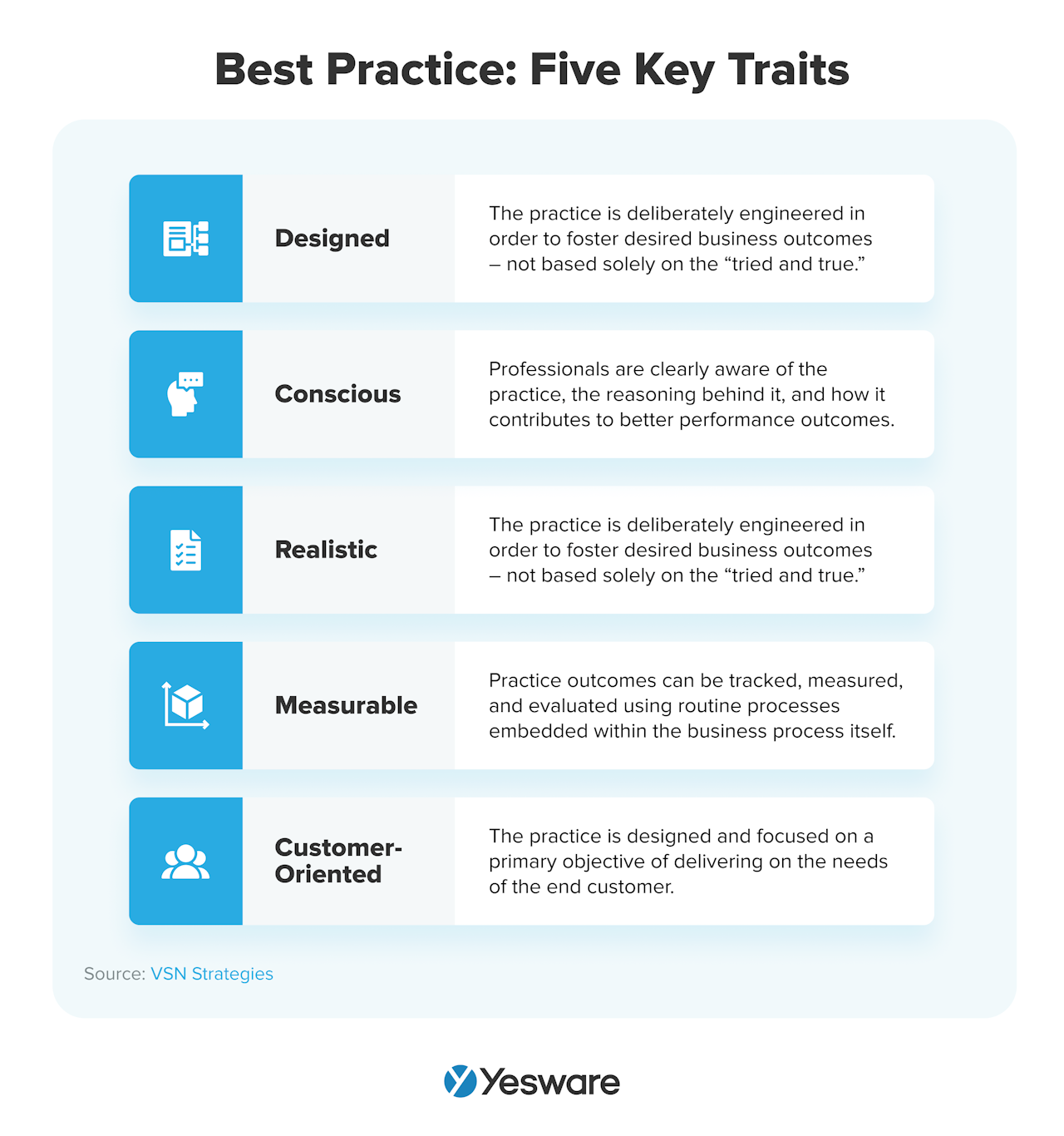 All sales best practices are built around a common set of fundamental sales principles: understanding your target audience, building a sales ICP and buyer personas, conducting market research, practicing effective communication, and setting clear sales goals.
All sales best practices are built around a common set of fundamental sales principles: understanding your target audience, building a sales ICP and buyer personas, conducting market research, practicing effective communication, and setting clear sales goals.
Understanding Your Target Audience
All sales success starts with a deep understanding of your team’s target audience. Sales reps and marketers should collaborate to define the wants, needs, challenges, pain points, and other behavioral characteristics that uniquely combine to create your target buyer.
ICP & Buyer Personas
Sales teams should work together alongside marketing to develop an ideal customer profile (ICP) and buyer personas. These profiles are how your team coalesces everything they know about your target customer into a streamlined snapshot of a best-fit buyer. 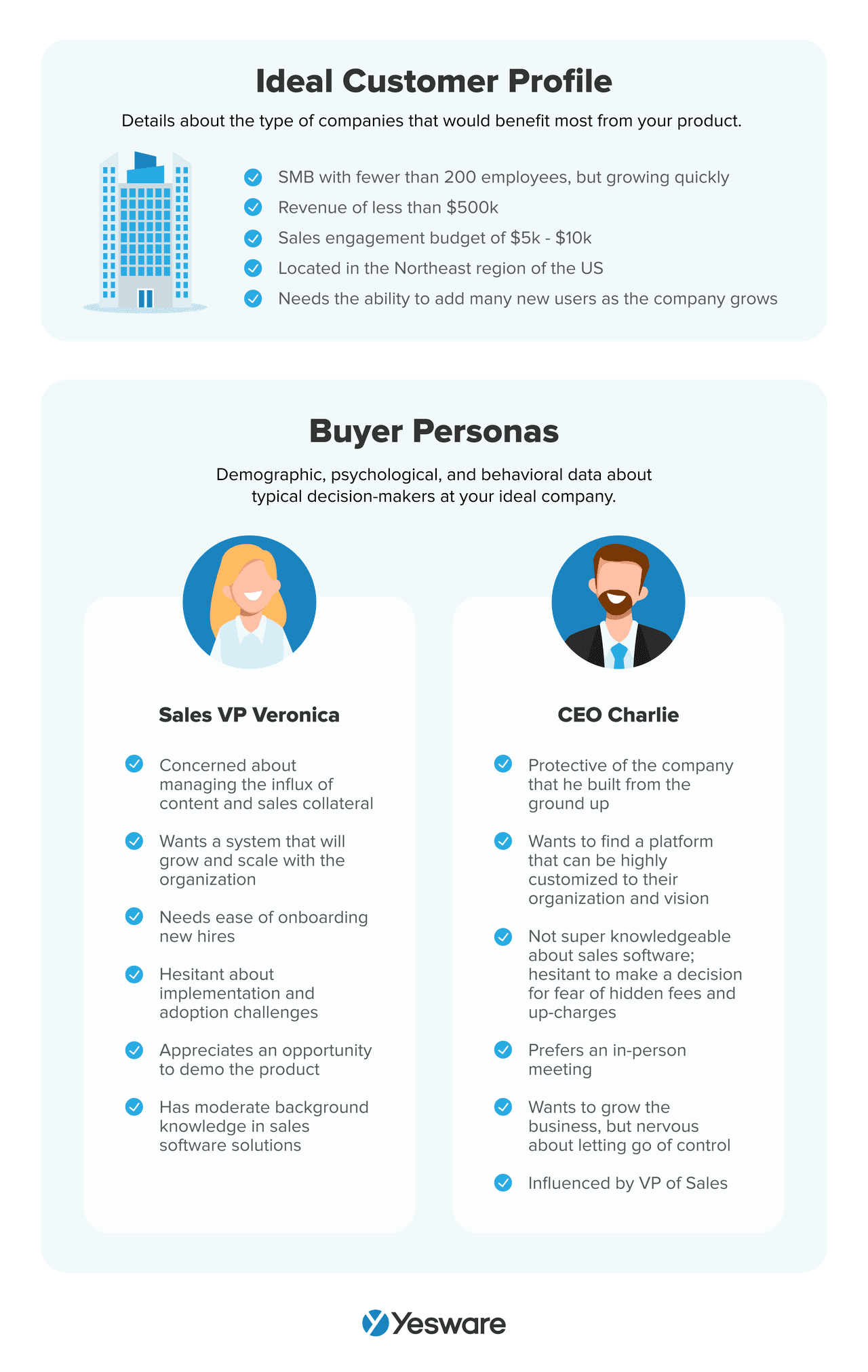 Without a common and tangible understanding of the unique characteristics that make up your target buyer, your sales process will be about as effective as if you tried to sell to the first fifty people who crossed your path.
Without a common and tangible understanding of the unique characteristics that make up your target buyer, your sales process will be about as effective as if you tried to sell to the first fifty people who crossed your path.
Market Research
It’s also important that sales teams have their finger on the pulse of the overall movement of the market at large.
Market research helps sales teams gauge the potential success of their product, identify upcoming trends that might affect sales, and predict how to remain competitive.
Market research can look like analyzing the product-market fit, tracking your competitors’ progress, keeping tabs on your brand’s reputation, and more.
Effective Communication Skills
Effective communication is perhaps the most important foundational skill for sales reps to master. All parts of the sales process rely on good communication, from building trust and rapport to negotiating closing terms.
Active Listening
Active listening is the act of listening to a speaker with the intent to understand the true message and meaning behind what they’re communicating.
This requires listeners to use body language, empathy, and more to demonstrate to the speaker that they are eager to know their authentic thoughts, feelings, and opinions. 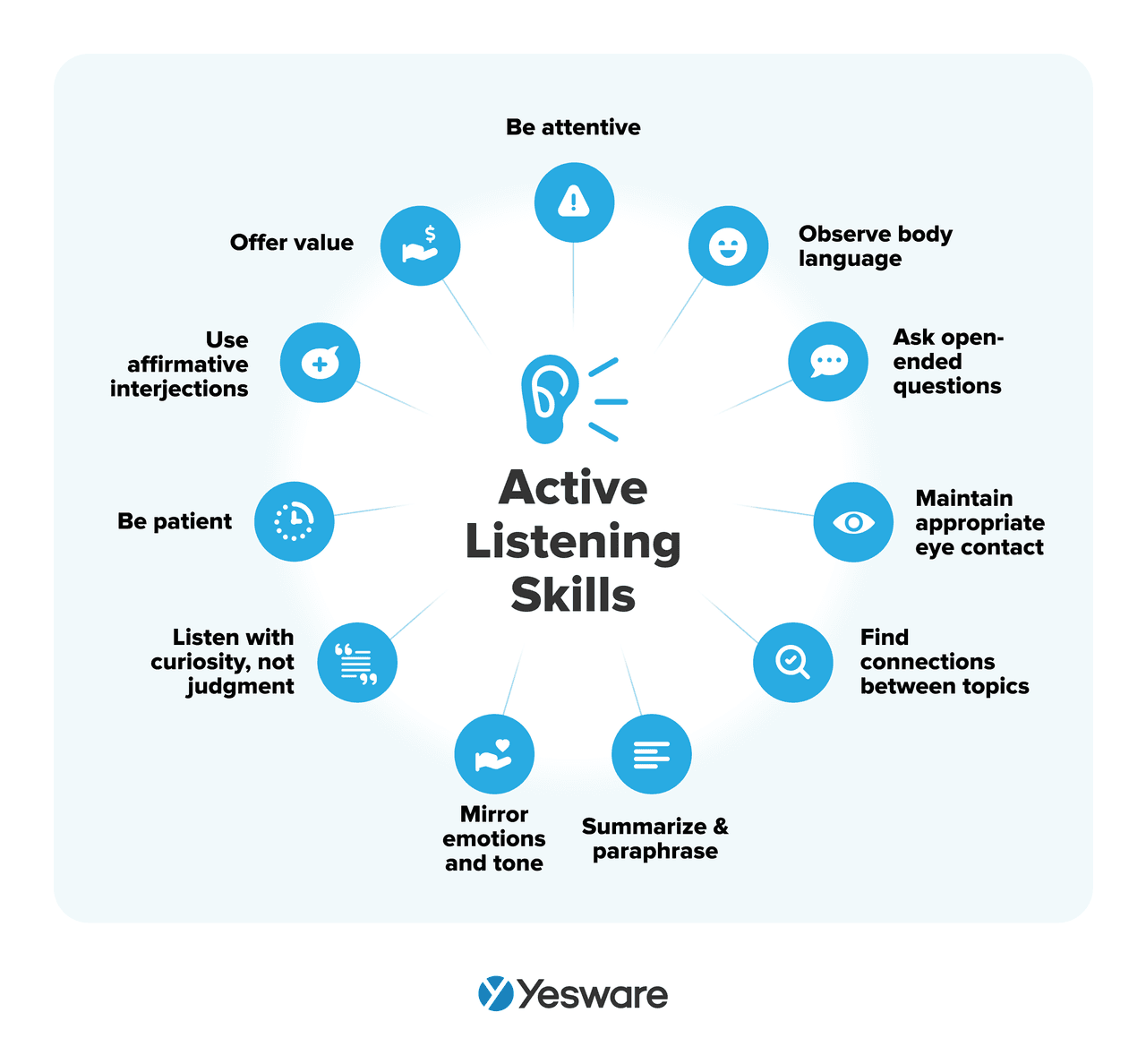 Active listening should be used during all parts of the sales process. It helps both parties feel like they’re on the same page, and that they’re working together toward a common goal.
Active listening should be used during all parts of the sales process. It helps both parties feel like they’re on the same page, and that they’re working together toward a common goal.
These techniques can help buyer and seller come to a consensus about the buyer’s needs, and how the seller can best meet them.
Building Rapport
Nobody wants to be sold to — even B2B buyers who know that they’re shopping for a new product. And savvy shoppers can smell fake small talk from a mile away.
That’s why it’s very important that salespeople practice their rapport-building skills so that they can build trusting, authentic relationships with prospects that lead to real, productive partnerships. 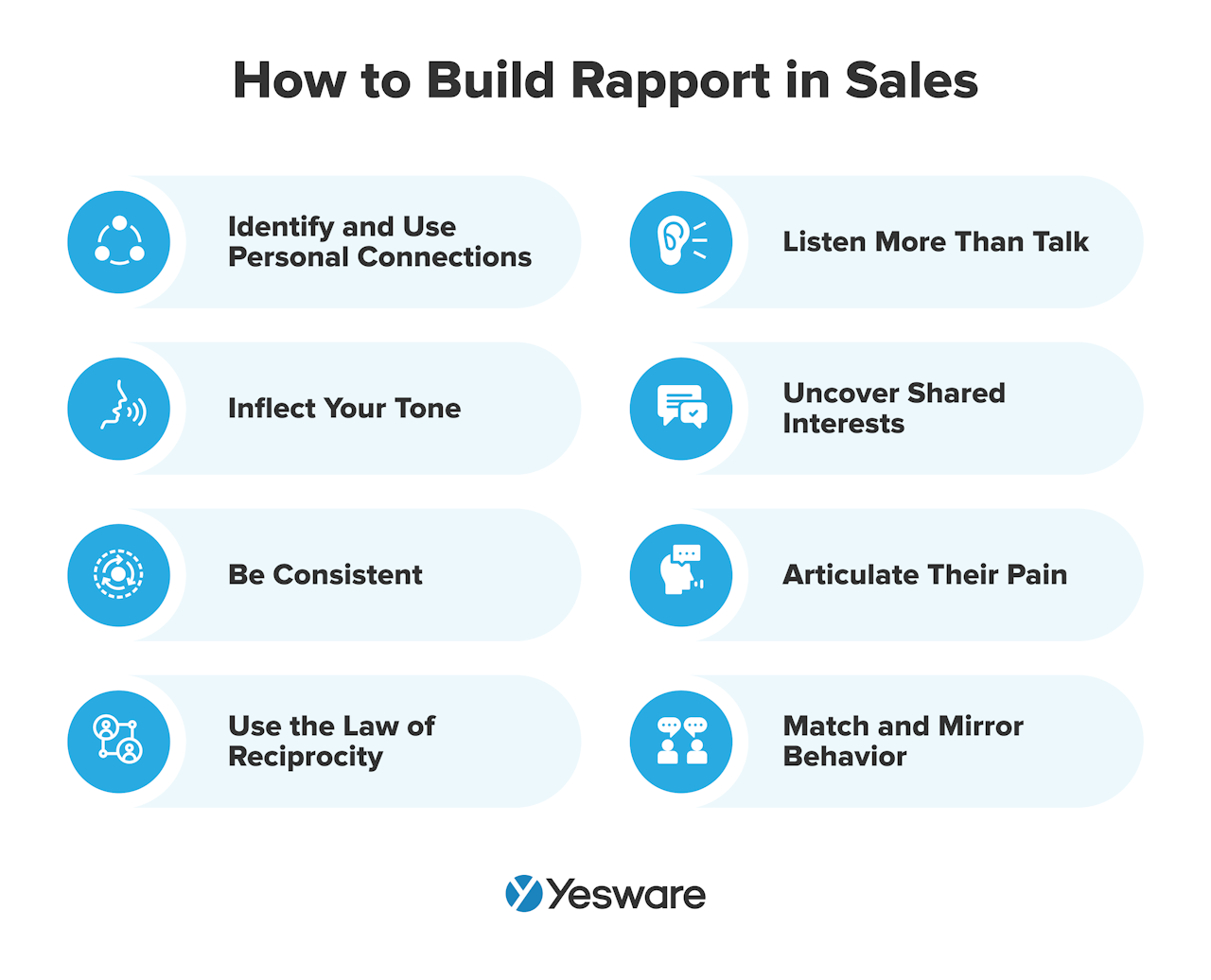
Setting Clear Sales Goals
Sales goals act as anchors for your sales team and are fundamental to your sales best practices. They provide clarity and control to salespeople, while simultaneously mitigating inherent and unexpected risks that may arise throughout the process. 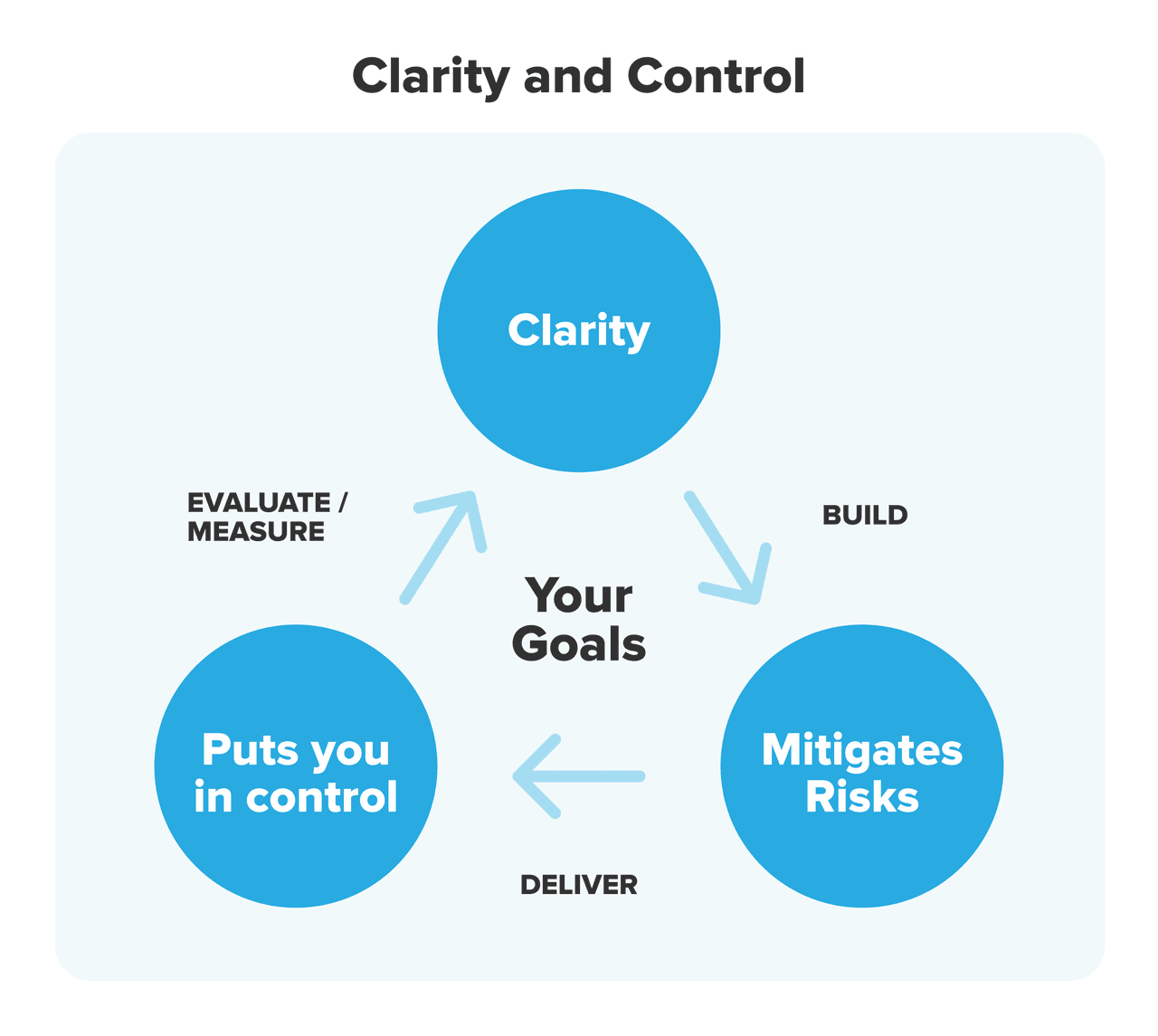 While most sales teams know, at some level, that sales goals are important, there are a couple of goal-setting best practices that all teams should follow in order to optimize their results.
While most sales teams know, at some level, that sales goals are important, there are a couple of goal-setting best practices that all teams should follow in order to optimize their results.
Short-term vs. Long-term Sales Goals
The first thing that sales leaders should keep in mind as they set goals is that they need to think both short-term and long-term.
Near-term sales targets help keep sales reps motivated and moving forward, while big-picture sales goals help ensure that their team contributes to overall business goals.
Fortunately, both short-term and long-term goals can be created using the same general process. 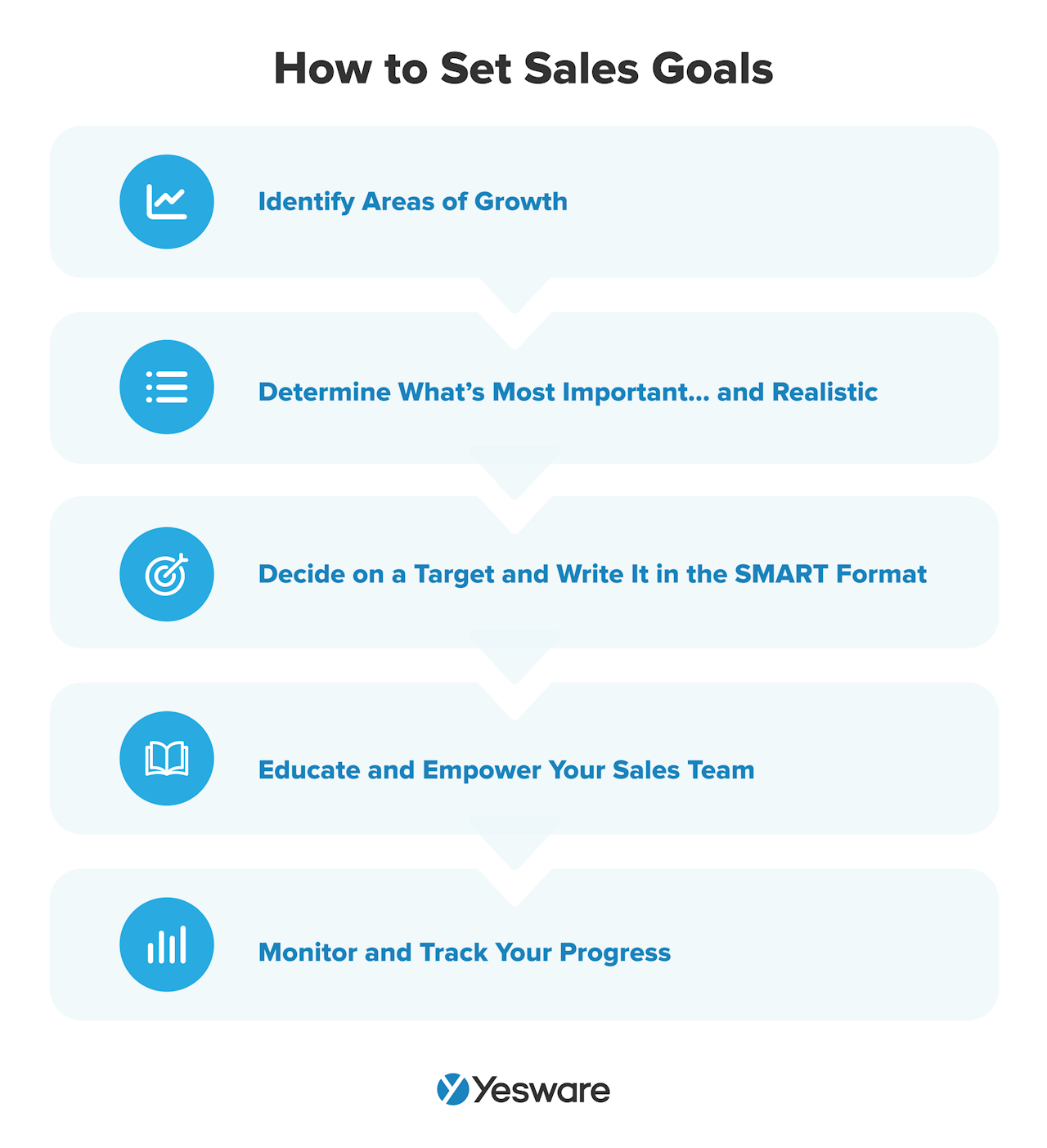
SMART Goals
The SMART goal framework helps goal-setters create targets that are bound by five criteria: specific, measurable, attainable, relevant, and time-bound. 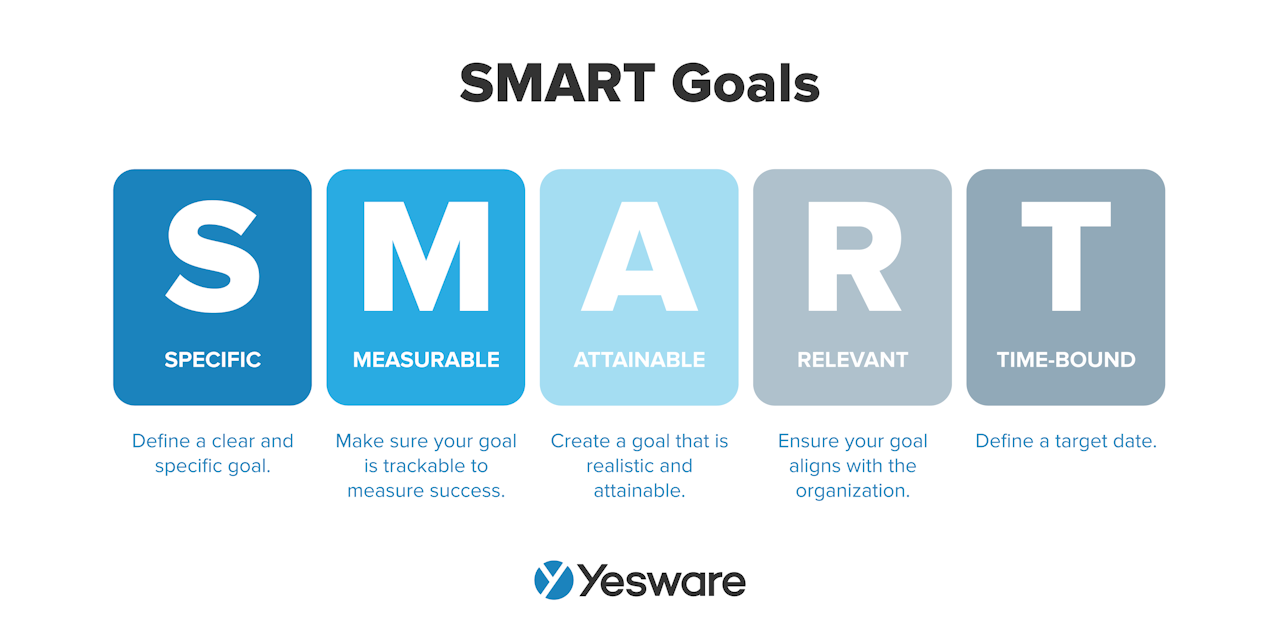 SMART goals help sales teams stay focused with challenging but achievable targets.
SMART goals help sales teams stay focused with challenging but achievable targets.
Building a High-Performing Sales Team
The people on your sales team will ultimately determine its success. Even the most optimized sales process can be tanked by an uncoachable, impersonable, or otherwise wayward group of sales reps.
There was a time in sales when talent was chosen based on a manager’s instinct or gut feeling about potential hires. However, recruiting and retaining outstanding sales reps who can both contribute individually and collaborate for the good of the group needs to be based on much more than just a first impression.
Building a high-performing sales team requires effective hiring, sales training, motivating compensation, and a culture of support and collaboration.
Hiring and Training
The people who make up your sales team are the ones who bring all of your pen-and-paper goals, targets, and strategies to life with real buyers. Hiring the right reps — and then onboarding them with the right approach — is one of the most impactful things a sales leader can do to improve their sales metrics and drive revenue growth.
Recruiting Top Sales Talent
Top-performing sales reps can bring in up to six to seven times the amount of revenue than their average-performing colleagues. They can also help improve your overall customer relationships, as well as your brand’s reputation.
Sales managers who hired and went on to lead top-performing sales teams report that some of the top sales rep skills they look for in potential candidates are coachability, resourcefulness, and emotional intelligence. 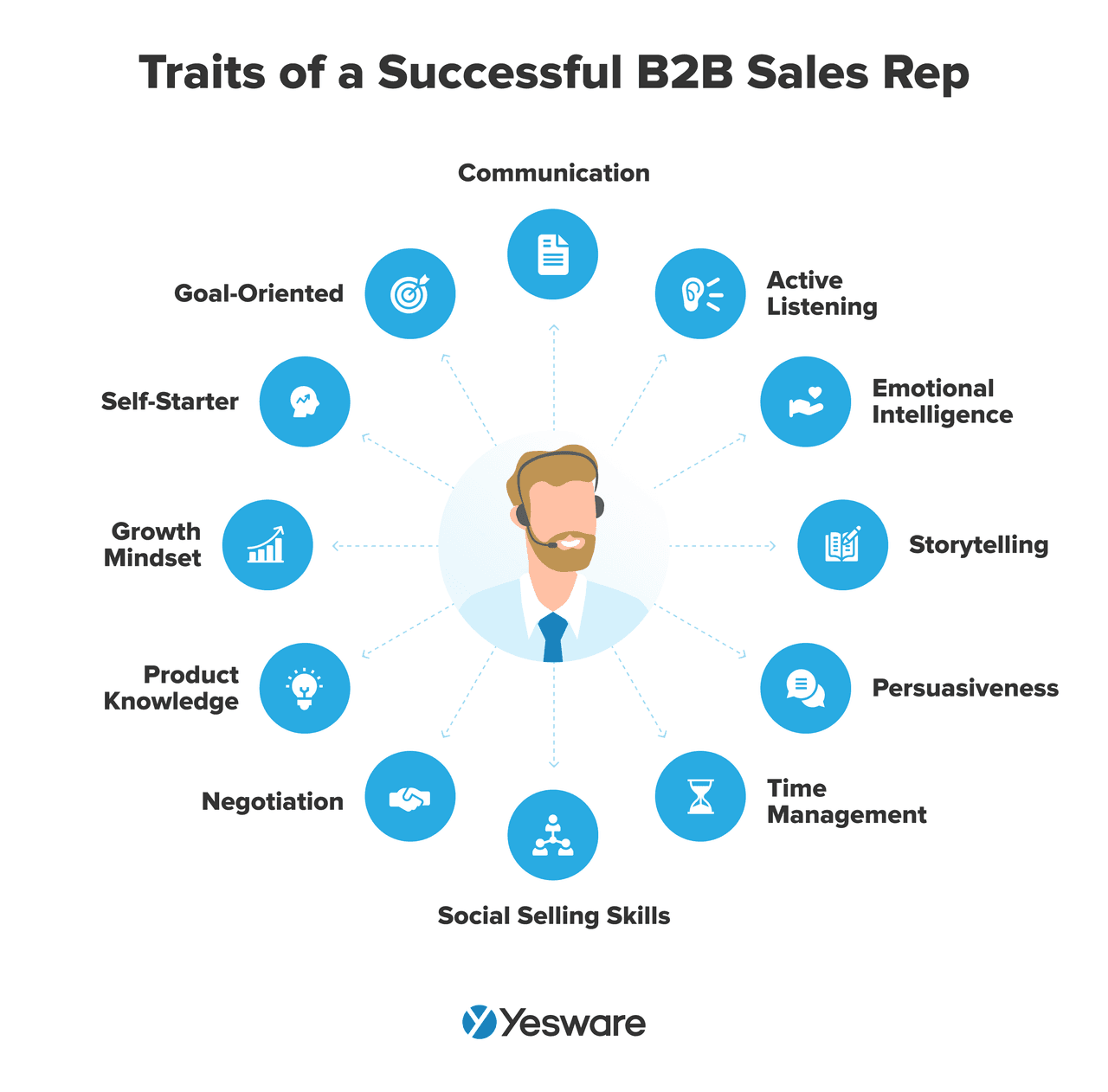 Of course, it’s up to the sales leaders and other relevant executives within your organization to determine the list of characteristics that most closely represent a high-performing rep for your team.
Of course, it’s up to the sales leaders and other relevant executives within your organization to determine the list of characteristics that most closely represent a high-performing rep for your team.
A list, outline, or matrix of hiring qualities can be helpful in adding some tangibility to the hiring process.
Onboarding and Continuous Training
Onboarding your reps with the tools and knowledge they need to be successful is one of the most important things a sales leader can do to improve rep performance and, ultimately, retention.
When sales reps feel like their management cares about providing the resources they need to do their job effectively, they’re much more likely to be loyal to your organization and put their best foot forward in the field.
Effective onboarding also improves ramp-up time, employee engagement, their perception of your company, and your team’s overall sales performance. 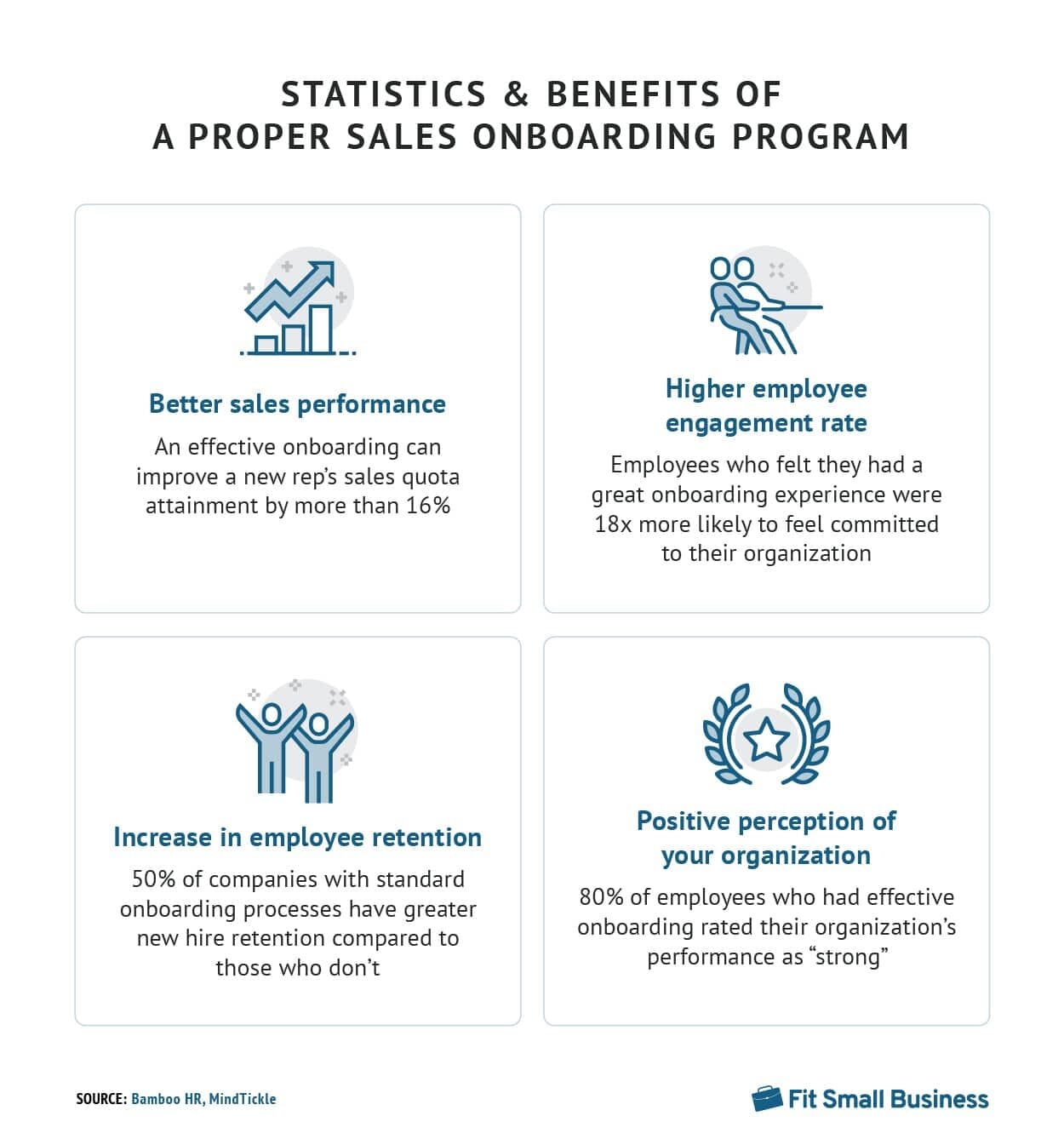
Product Knowledge
Each of your sales reps needs to be an expert on the product or service they’re trying to sell.
The product features and benefits are the bread-and-butter here, but reps also need to be able to fluently describe your offer’s unique selling point (USP), value proposition, use cases, and more. 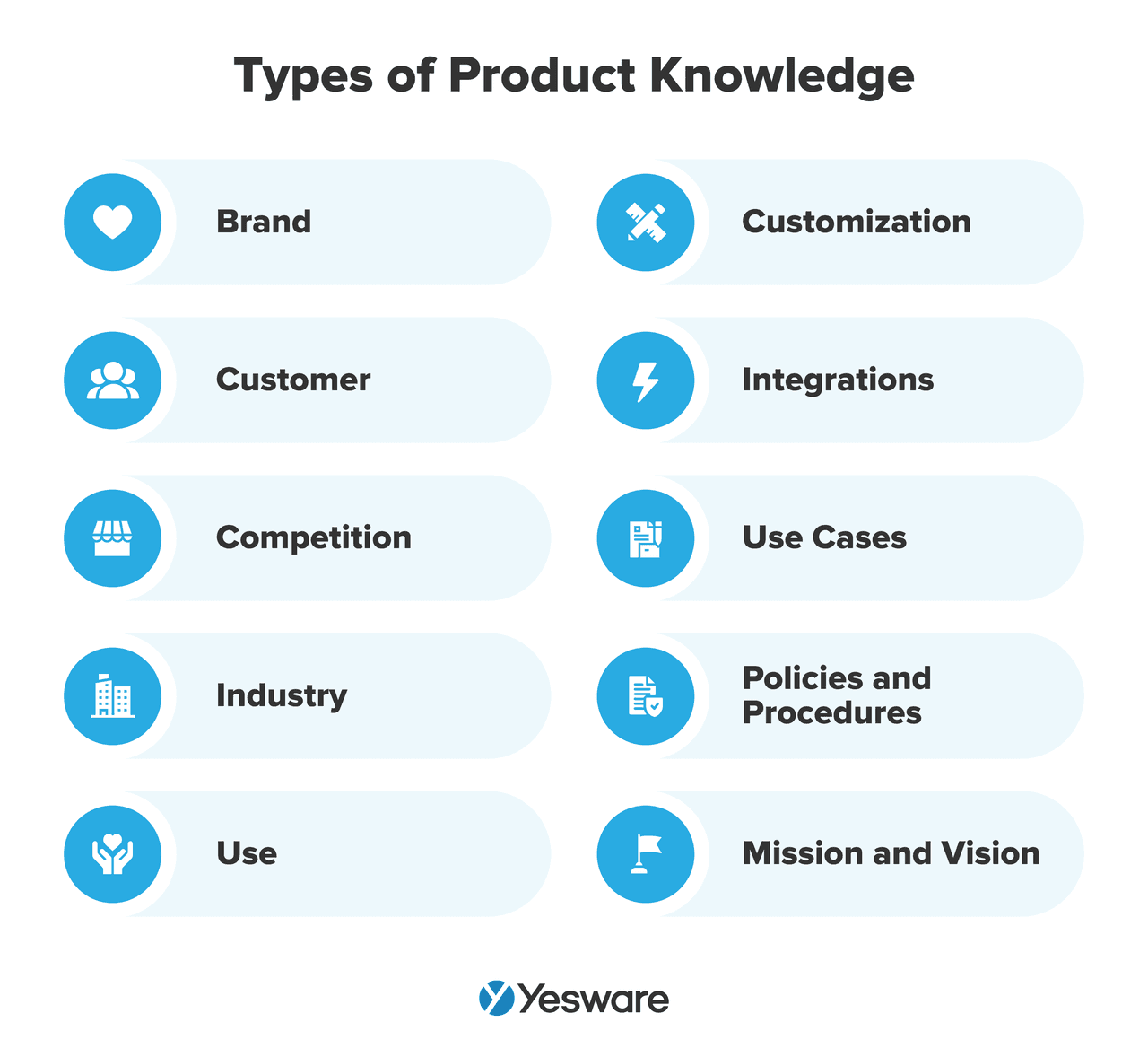 They also need to be able to speak to prospect objections with care and consideration, in a way that nonetheless makes the product shine.
They also need to be able to speak to prospect objections with care and consideration, in a way that nonetheless makes the product shine.
As with just about everything in sales, reps should frame their approach to learning product knowledge around the buyer’s perspective. This is why buyer personas are so important; some decision-makers may appreciate very technical product knowledge, while others care more about the ROI and overall outcomes. Sales reps need to be well-versed enough in all of these categories that they can speak to the needs of various different buyers.
Motivation and Incentives
The way that you engage, motivate, compensate, and recognize your sales team can make or break their success.
There are two primary areas to consider when it comes to paying your sales team what they’re worth: their specific sales compensation plan, and the ways in which you recognize and reward their hard work and successful results.
Sales Compensation Plans
The sales compensation plan outlines how a member of the sales team gets paid.
Most sales compensation plans incorporate some combination of a base salary, commission, and (sometimes) scheduled or performance-based bonuses.
Some sales compensation plans may also include other benefits, like health care or travel perks.
Sales compensation plans are not one-size-fits-all, even within the same sales team. Each one is unique in design as well as final payout, as many plans depend on the performance of the sales rep over a certain period of time.
Regardless of the specifics of your compensation plan, however, there are a few foundational elements to keep in mind as you create them for the members of your team.
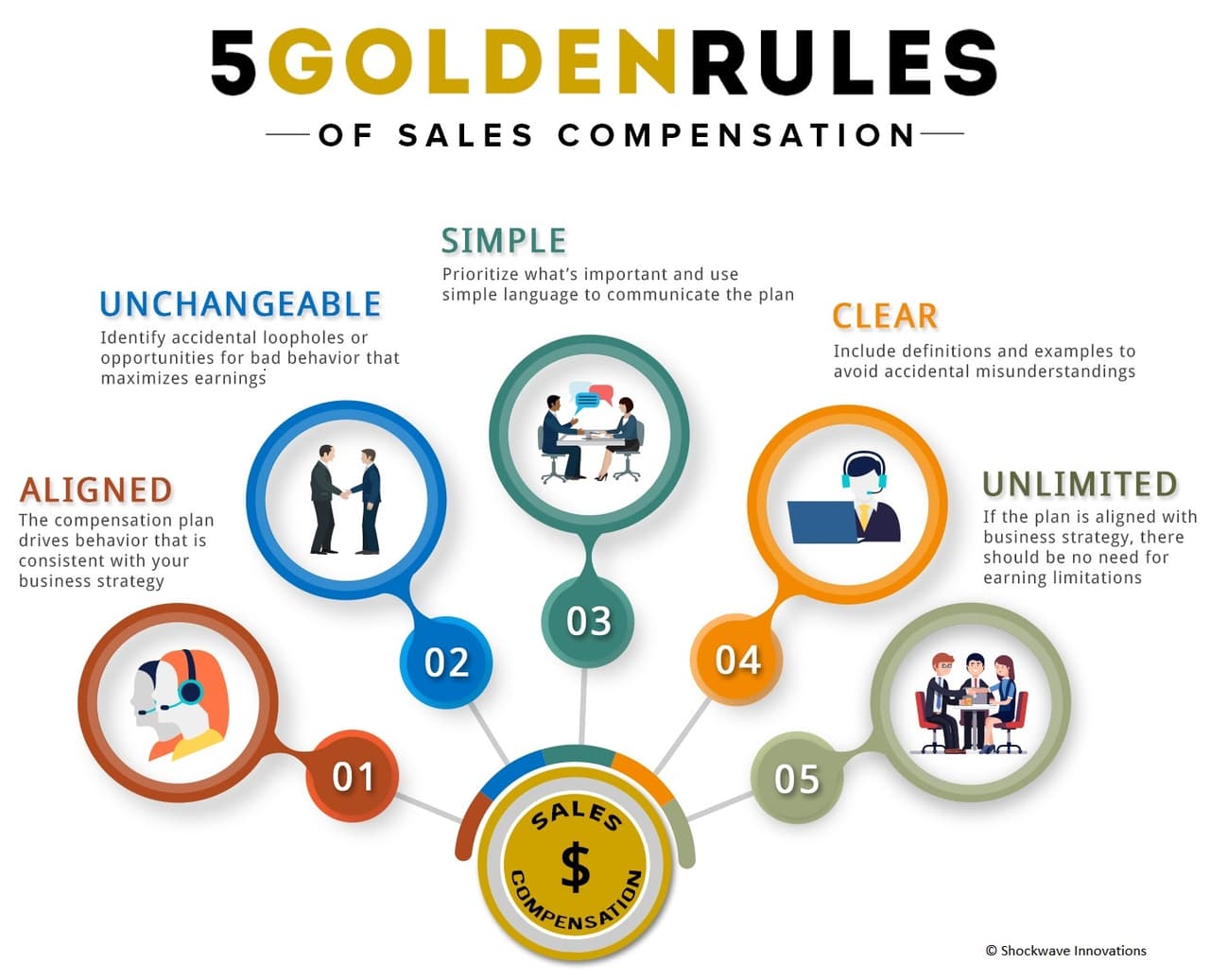
When designed and executed correctly, sales compensation plans can help motivate and engage your sales employees.
There should be a healthy balance of financial security (usually through some type of base salary), professional challenge (usually achieved with a commission incentive), and an opportunity for additional recognition for outstanding performance (e.g., bonuses and other rewards).
Effective sales compensation plans are also important for sales leaders and other higher-up executives, as they help drive accurate sales forecasting.
Recognition and Rewards
Sales reps perform best when they feel recognized and appreciated in ways beyond their normal compensation. 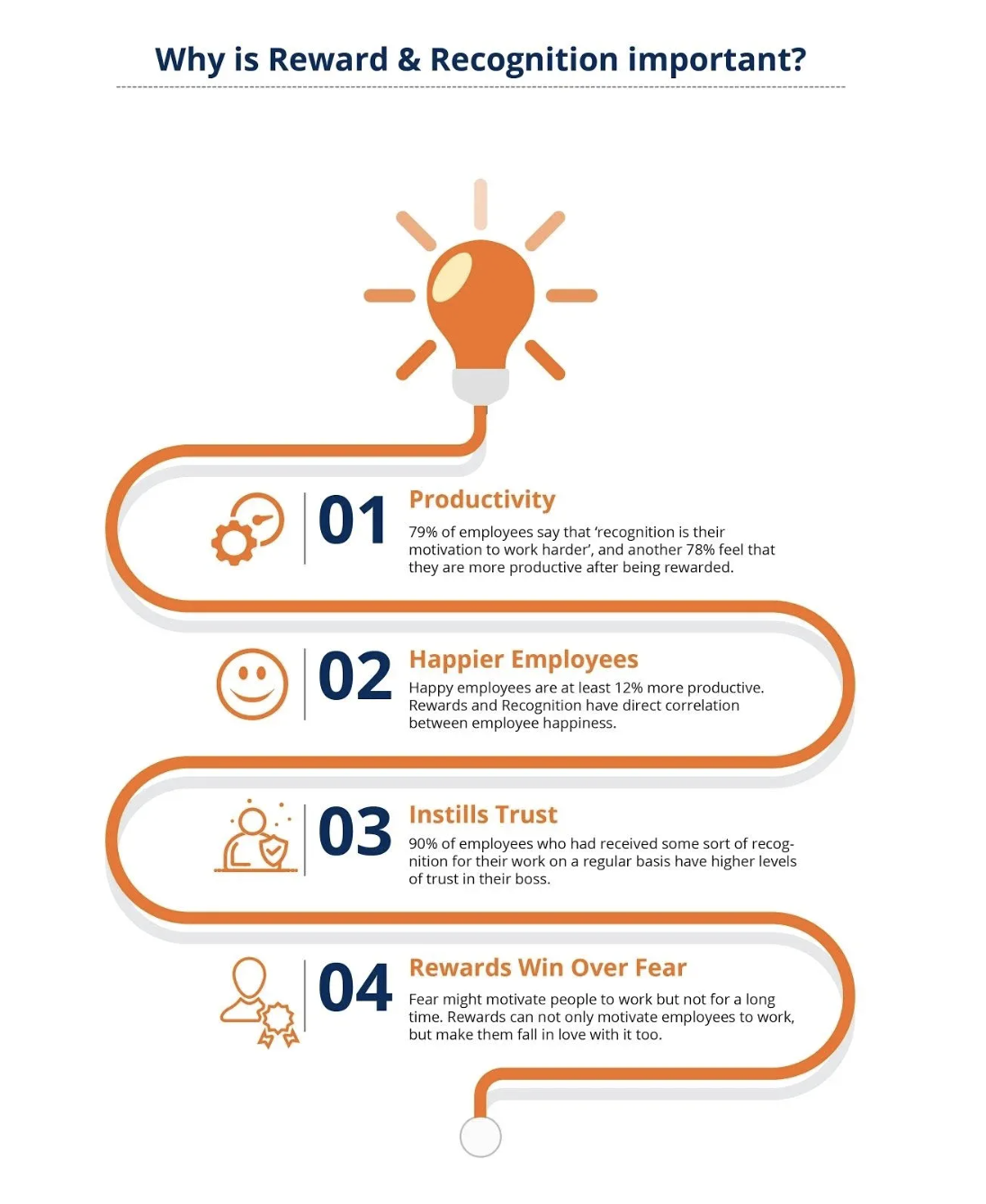 That’s because employee recognition is key to engagement.
That’s because employee recognition is key to engagement.
Companies that prioritize employee engagement enjoy 20% higher profits than those with disengaged employees.
Sales incentives can be monetary or not — the key is to offer rewards that add true value to your employees’ lives. 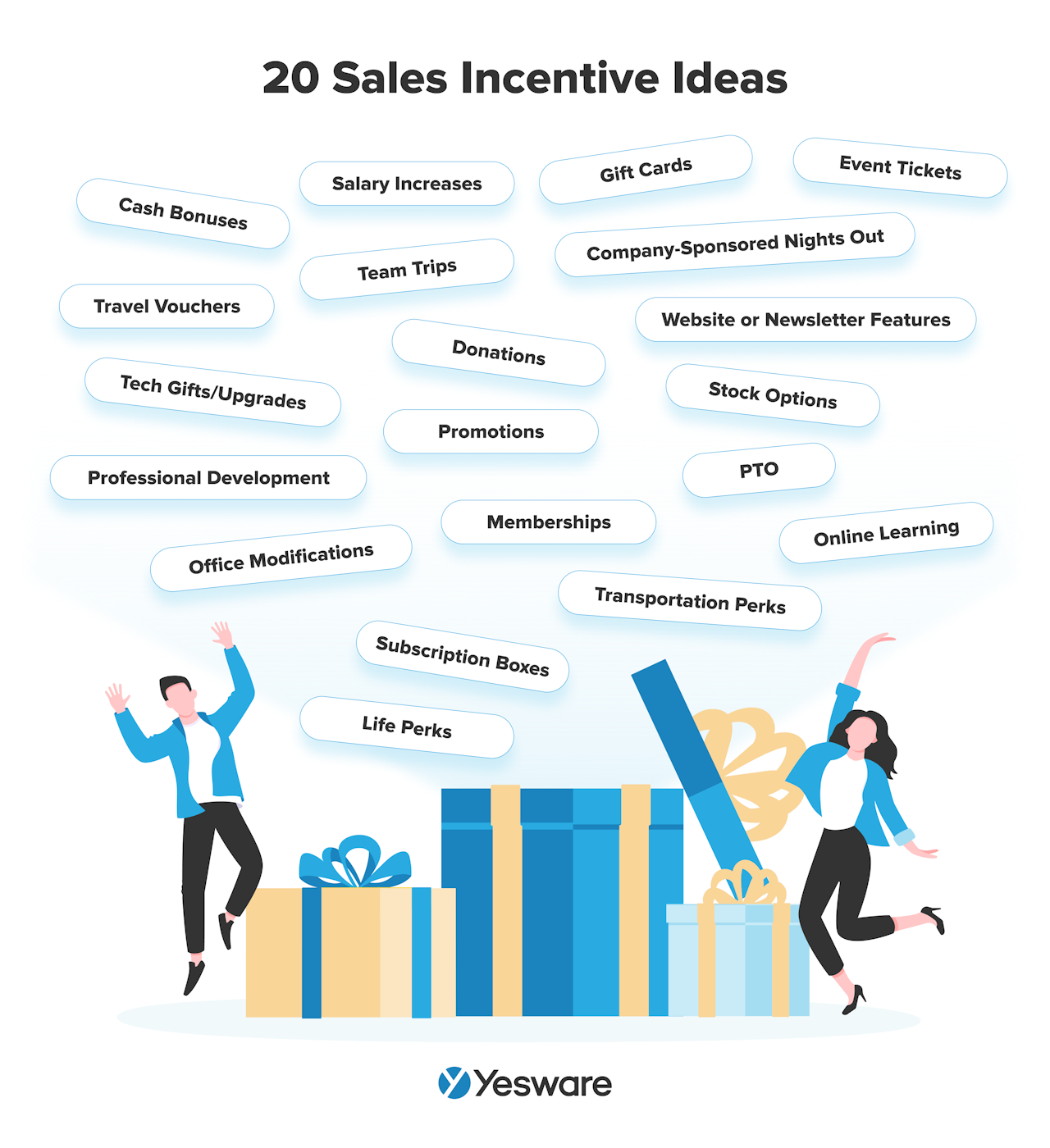
Team Collaboration and Support
The worst thing a sales team can do is work in silos. Successful sales teams rely on constant collaboration, as well as a team culture of support and camaraderie. Collaboration is an absolutely essential sales best practice.
Cross-Functional Collaboration
Effective team collaboration is closely correlated with improved performance and significant account growth.
A Yesware study of over 200 companies on sales team collaboration found that companies who shared their best practices with one another enjoyed several benefits.
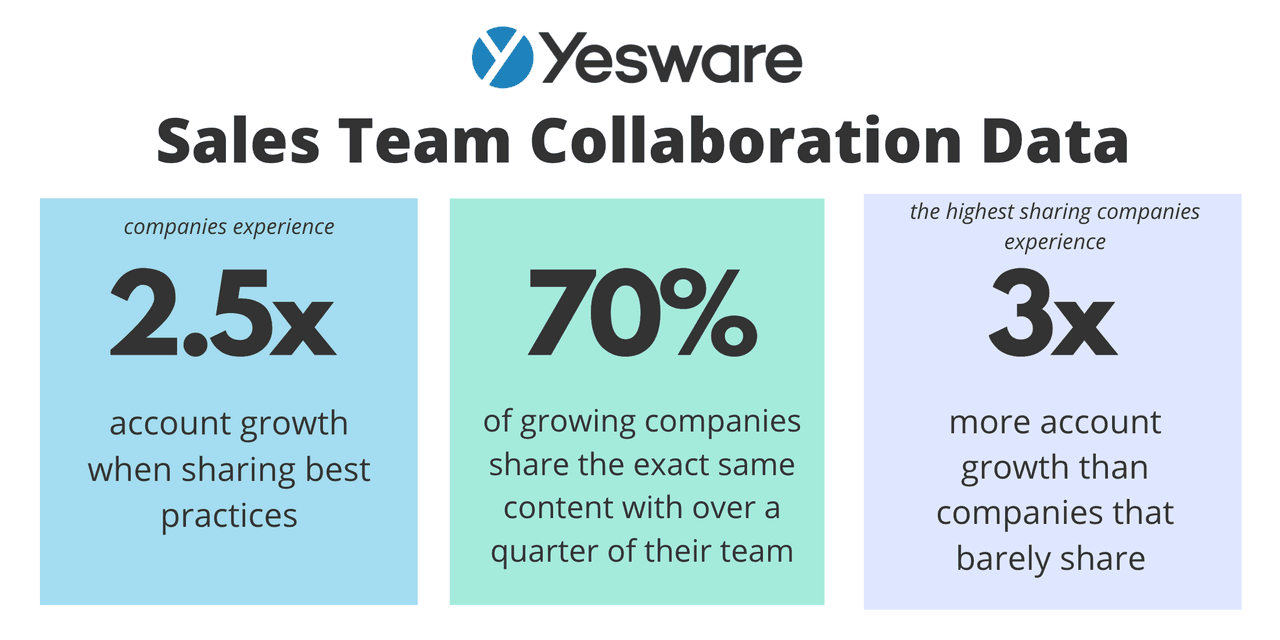
With the dramatic shift to mostly remote work due to the pandemic, leaders need to be more proactive than ever about giving their teams (sales and marketing) opportunities to productively collaborate.
Choosing the right sales tool can make all the difference here. Yesware, for example, allows teams to easily share email templates and entire campaigns among everyone on the team.
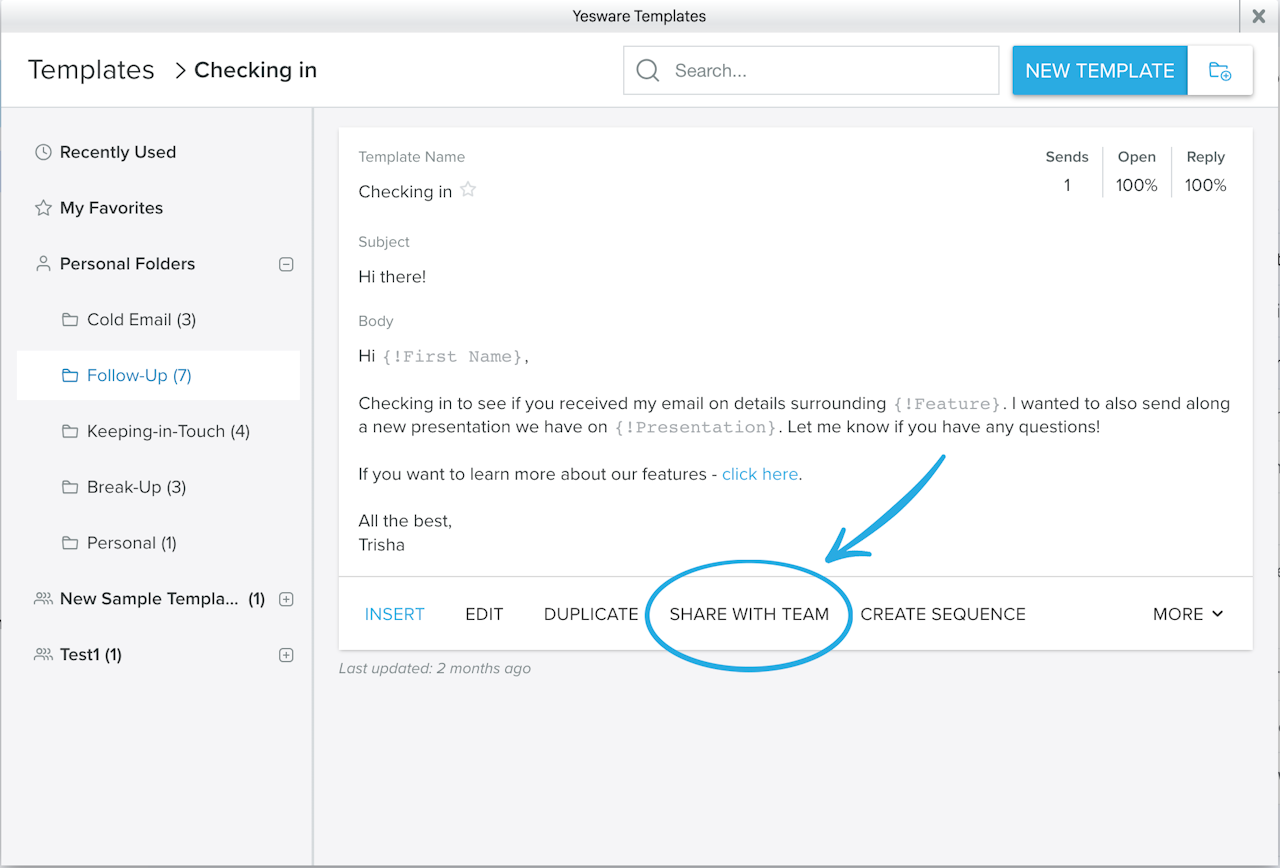
Keep in mind that most sales reps are competitive by nature. While a little bit of healthy competition can be motivating and fun, sales leaders should work hard to instill a culture of communication and supportive collaboration.
Mentorship and Coaching
An effective sales coaching program can transform a sales team from successful to elite. 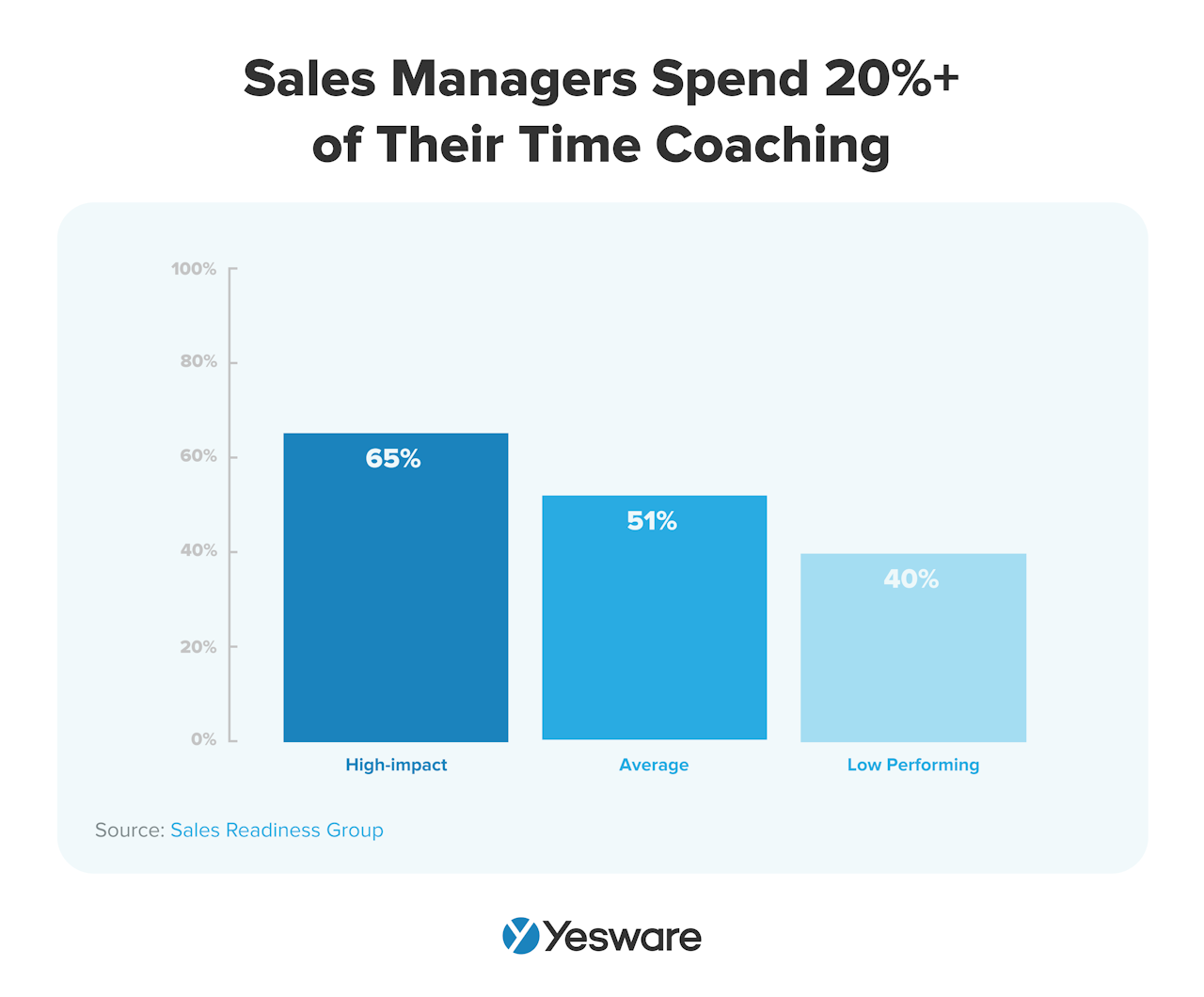 In fact, sales coaching is one of the most impactful skills a sales manager can add to their toolbelt. Harvard Business Review reports that high-quality sales coaching can improve a team’s sales performance by 19%, regardless of their chosen sales methodologies, the specifics of their sales process, or their level of employee experience or training.
In fact, sales coaching is one of the most impactful skills a sales manager can add to their toolbelt. Harvard Business Review reports that high-quality sales coaching can improve a team’s sales performance by 19%, regardless of their chosen sales methodologies, the specifics of their sales process, or their level of employee experience or training.
Sales coaching requires a decidedly different set of skills than sales management. While there is some overlap between the two, sales managers who want to become effective sales coaches need to hone in on the key differences between the two roles. 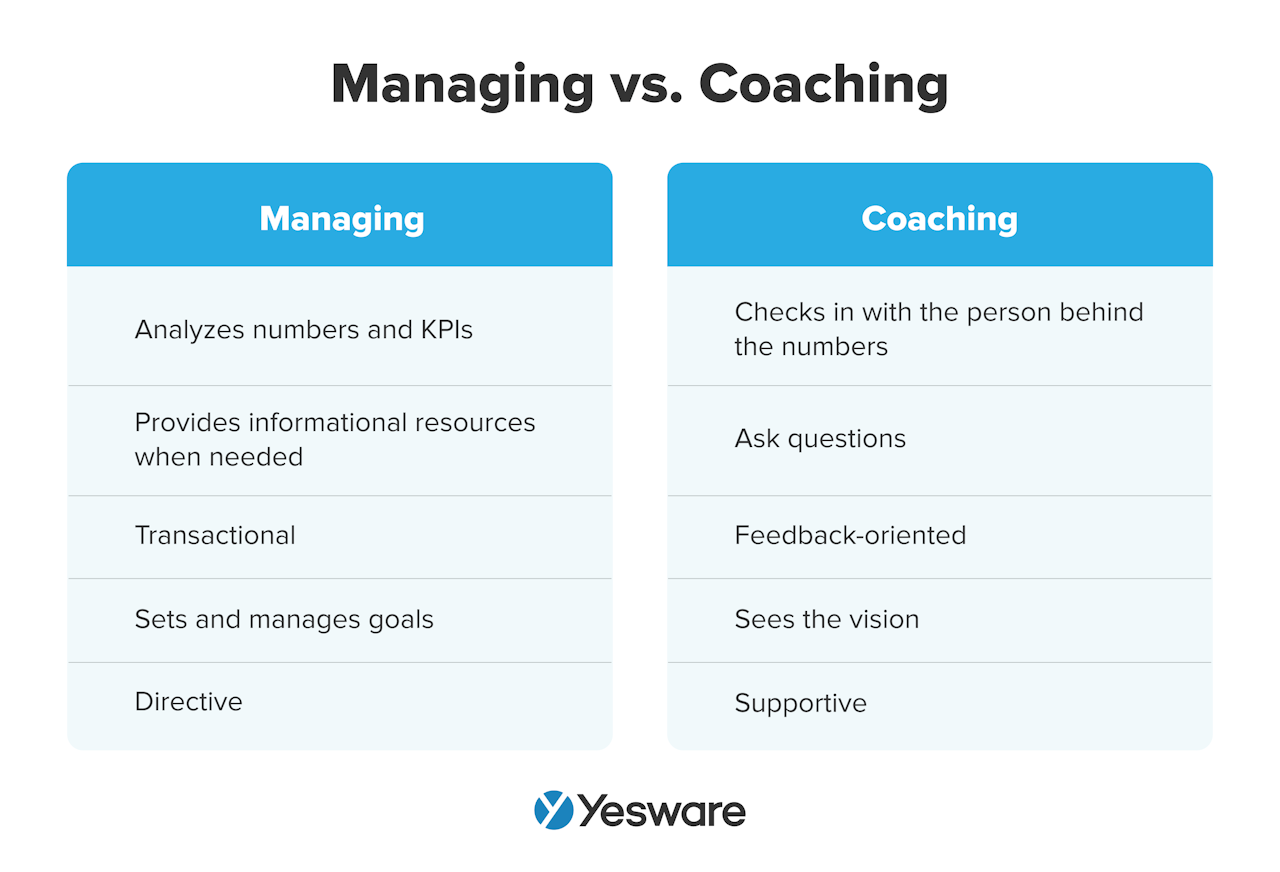 Tip: Looking for more sales best practices?
Tip: Looking for more sales best practices?
Grab our free ebook below which is filled with data-backed findings on the more effective sales strategies and techniques.
 Sales Engagement Data Trends from 3+ Million Sales ActivitiesLooking at millions of tracked email activity over the past few years, this ebook is filled with our top studies and findings to help sales teams accelerate results.
Sales Engagement Data Trends from 3+ Million Sales ActivitiesLooking at millions of tracked email activity over the past few years, this ebook is filled with our top studies and findings to help sales teams accelerate results.
Sales Process Optimization
Sales teams that implement formalized sales processes are more likely to be high-performing than those that lack structure.
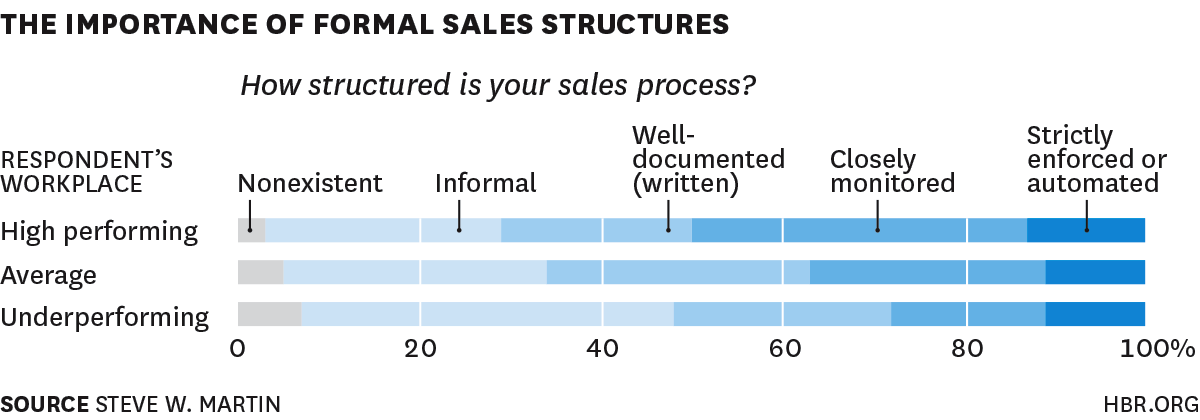
Creating structured, automated, growth-oriented sales processes requires a team-wide, standardized understanding of the roles, expectations, and accountability requirements of everyone involved.
Understanding the Sales Funnel
In some respects, everything in sales revolves around the sales funnel. 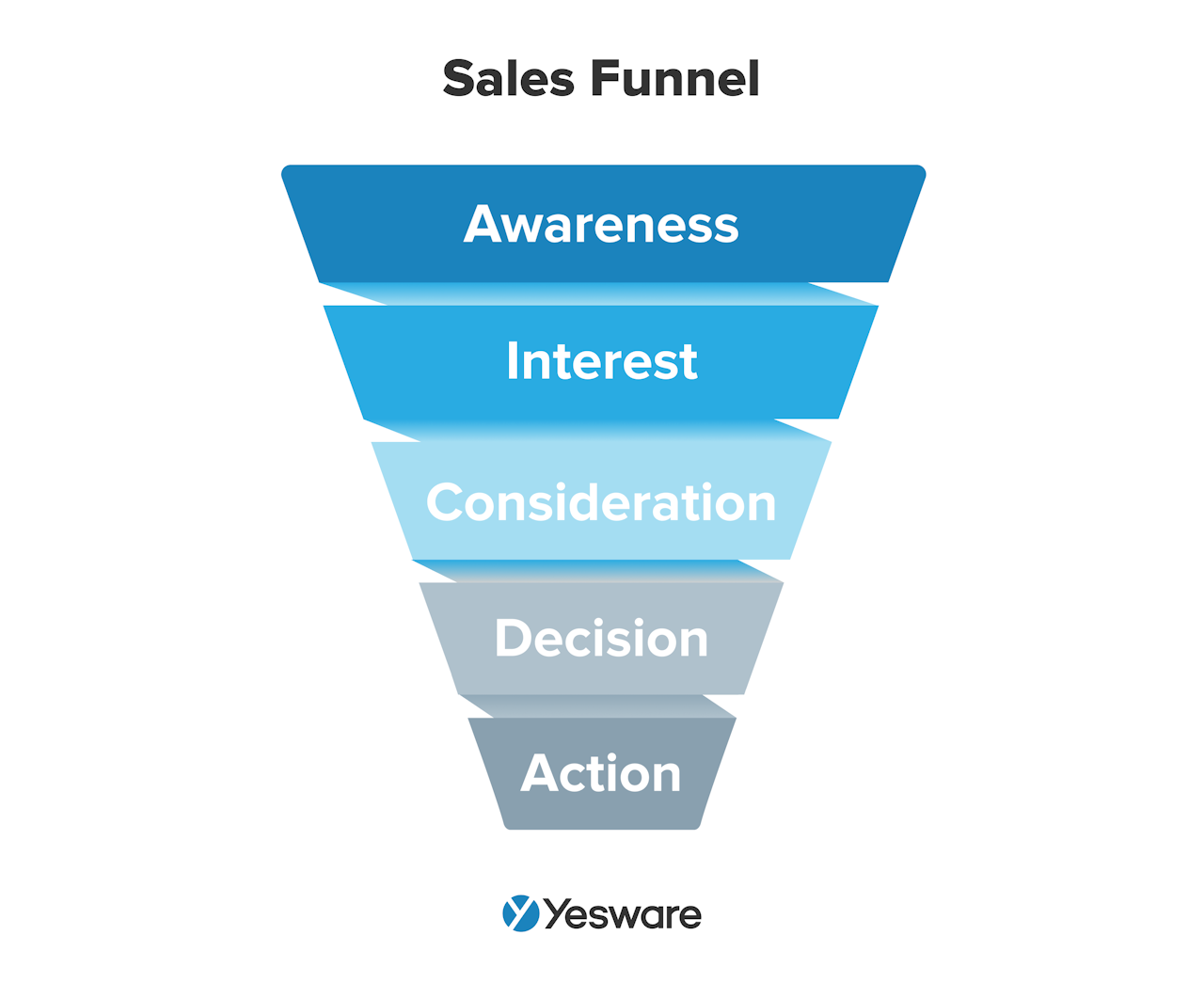 The sales funnel is a visual representation of the sales process. It helps inform sales reps about how to interact with buyers with relevant value according to where they currently sit in the sales pipeline.
The sales funnel is a visual representation of the sales process. It helps inform sales reps about how to interact with buyers with relevant value according to where they currently sit in the sales pipeline.
Prospecting
Sales prospecting is the process of identifying potential customers and initiating contact with them.
Sales teams that are great at prospecting also know to track and measure their results, so they can optimize the process.
Prospecting looks different for every team, and the strategies and tactics your team uses will depend most heavily on the needs and preferences of your target market.
Prospecting can also look different for inbound sales and outbound sales. 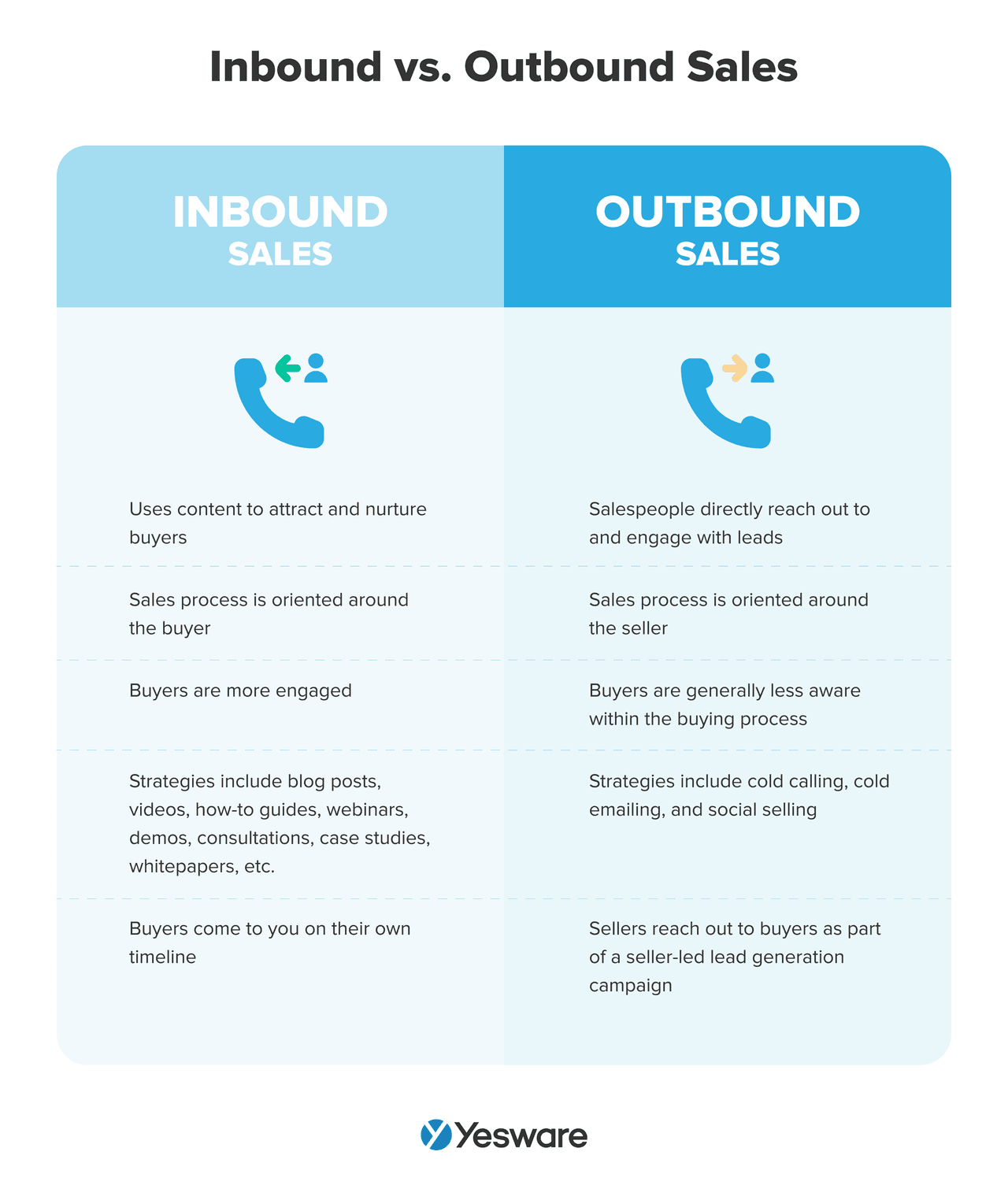 More than 40% of sales reps report that prospecting is the most challenging part of the sales process for them — more than any other stage.
More than 40% of sales reps report that prospecting is the most challenging part of the sales process for them — more than any other stage.
The more that sales managers can add structure and automation to the process with tools like Yesware’s Prospector — with access to enriched data for 100+ million businesses — the easier the entire sales process will be for their sales reps.
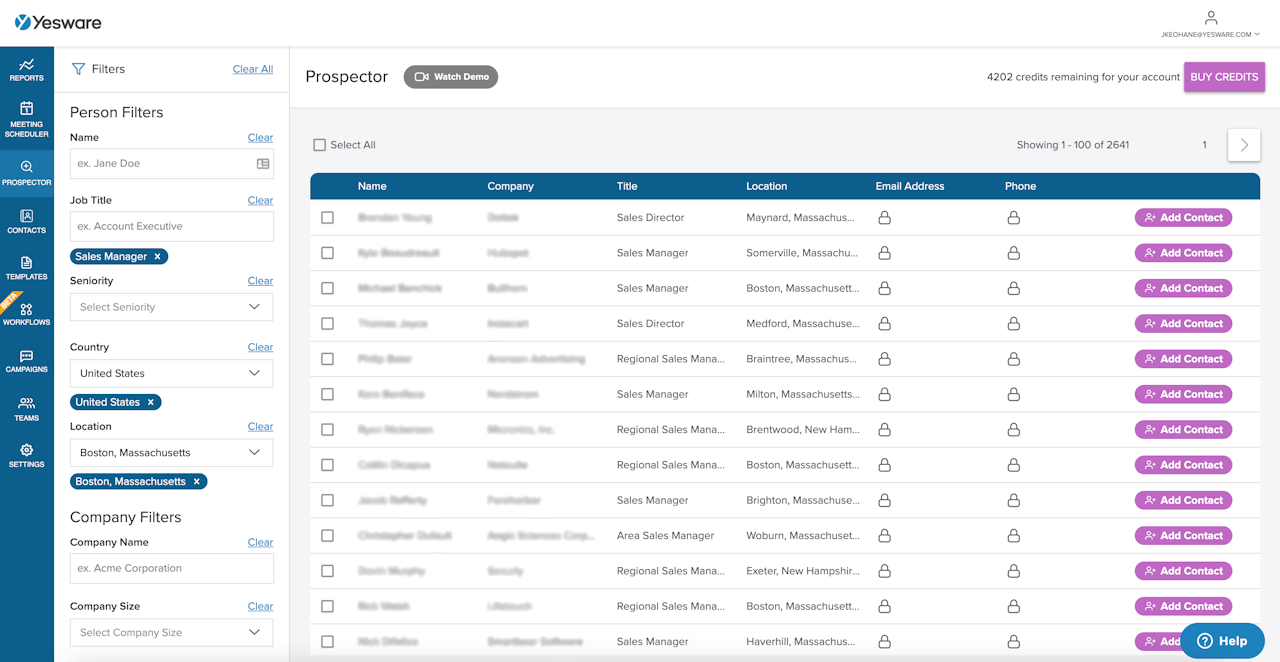
Qualification
Lead qualification occurs after prospecting. This is the process of determining which prospects are most promising.
To qualify leads, sales teams should start by comparing each one against their ICP and buyer personas. This helps narrow down the prospects who represent a good fit on paper.
Then, sales reps need to practice asking open-ended sales questions to prospects. This helps determine their levels of need, interest, and readiness to purchase. 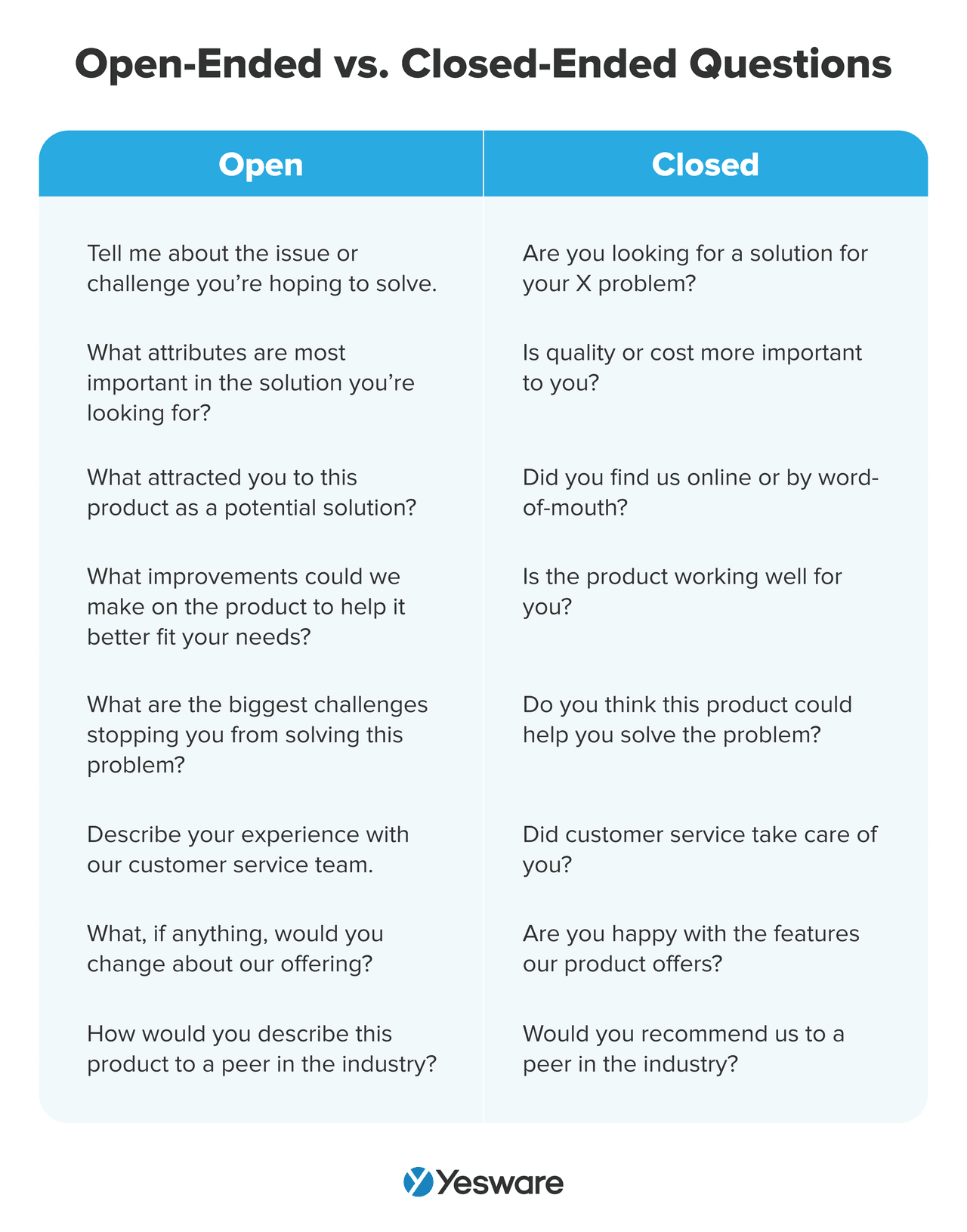 Some sales teams find benefit in using a lead-scoring model to help determine how to best prioritize their prospects.
Some sales teams find benefit in using a lead-scoring model to help determine how to best prioritize their prospects. 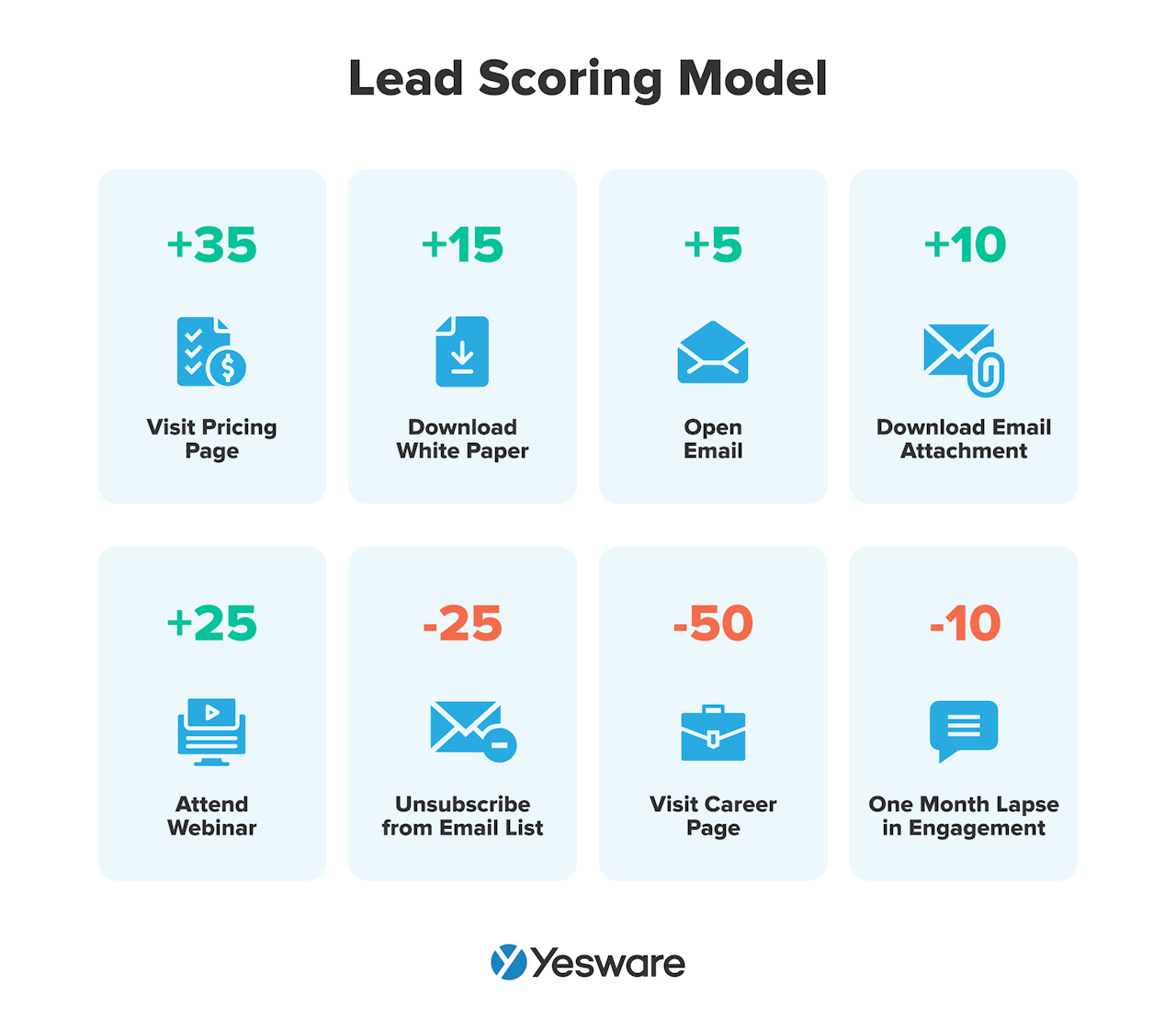 Lead scoring can take a variety of different forms. Some models are points-based, while others place prospects on more of a spectrum.
Lead scoring can take a variety of different forms. Some models are points-based, while others place prospects on more of a spectrum.
All of them, though, are based on a variety of demographic and behavioral data relevant to your buying process.
Remember — the key is to add structure wherever you can. Qualifying leads is a process that can become too subjective and murky if sales teams aren’t careful. Lead scoring is a good way to add some objectiveness and standardization to the process, but you may find that another strategy works better for your team.
Presentation
The definition of a successful sales presentation has shifted over the last several years. Buyers today do not have the bandwidth for hours-long, drawn-out pitches. Sales reps need to be able to drive home the value of their offer in something more akin to an elevator pitch than a full-blown presentation.
The better you know the prospect to whom you’re pitching, the more likely you’ll be to create a winning presentation. A prospect-focused pitch is key to making the connection required to present your value effectively. 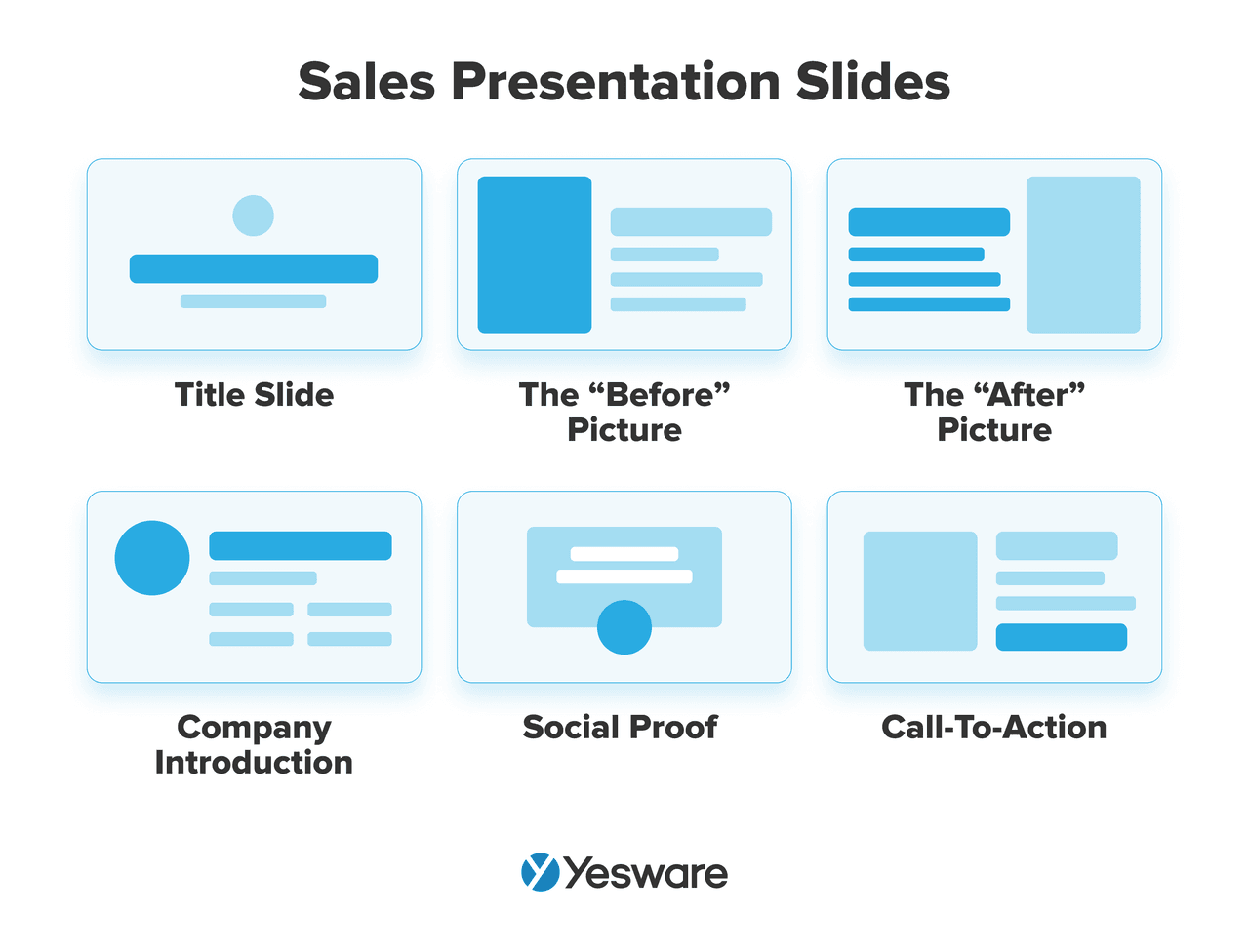 It’s also important to take into consideration the nuances between delivering an online presentation versus an in-person pitch.
It’s also important to take into consideration the nuances between delivering an online presentation versus an in-person pitch.
If you need to send out a slide deck for a remote presentation, for example, it’s important to master the strategy and best practices around digital decks (i.e., the first 3 slides are crucial — readers who read those are 80% more likely to read the entire deck).
On the other hand, active listening is key for in-person presentations, where prospects may have real-time questions or objections.
Closing
The close is the final stage of the sales funnel. By this part, all objections have been handled, questions have been answered, and terms have been discussed. Both parties have agreed upon a mutually beneficial solution.
Just like all of the previous stages, closing the sale requires personalization.
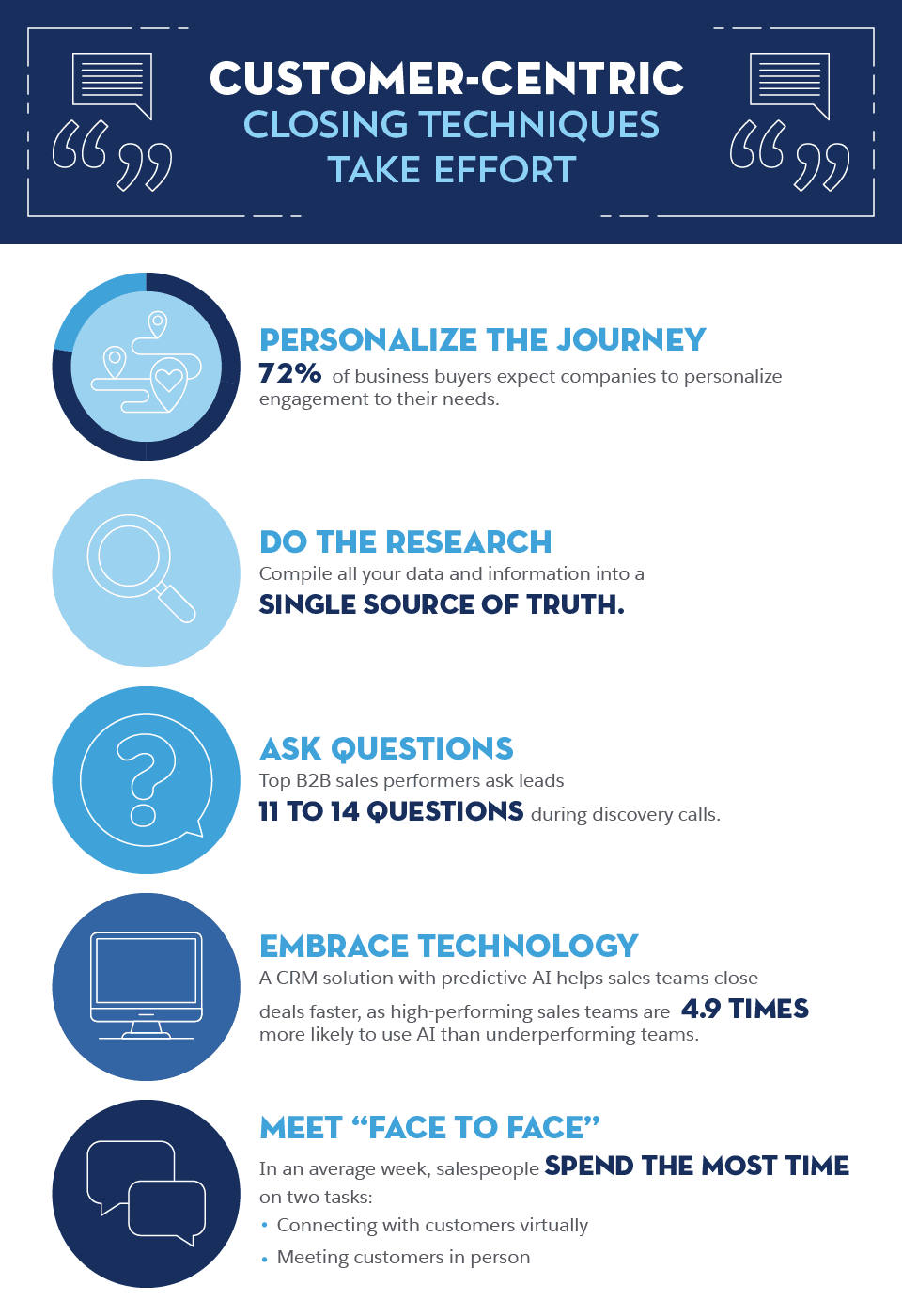
Fortunately, the rise of digital marketing has given sales reps a lot of leverage when it comes to prospects who aren’t quite ready to close, but who were otherwise very engaged during the process. They can be funneled into a nurture email sequence that’s designed to keep them engaged (and keep you at the forefront of their minds) until they’re ready to pull the trigger.
Leveraging Technology
Technology is a non-negotiable sales best practice in today’s sales world. Even the most bare-bones tech stack of an email operating system and a CRM system need to be an integral part of your day-to-day sales processes.
There are also more specialized platforms, like sales engagement, sales enablement, and sales compensation software that can bring valuable, time-saving automation to just about every part of the sales process.
CRM Systems
The CRM is like a sales rep’s Rolodex on steroids. It’s responsible for housing, tracking, and sometimes analyzing customer data, including information about previous interactions with sales reps.
Some sales leaders are discouraged by low CRM adoption. A CRM strategy and the various platforms can be quite complex and sophisticated; if sales reps don’t get properly trained in the ins, outs, and expectations of the tool, it’s unlikely to be of great use to your team. 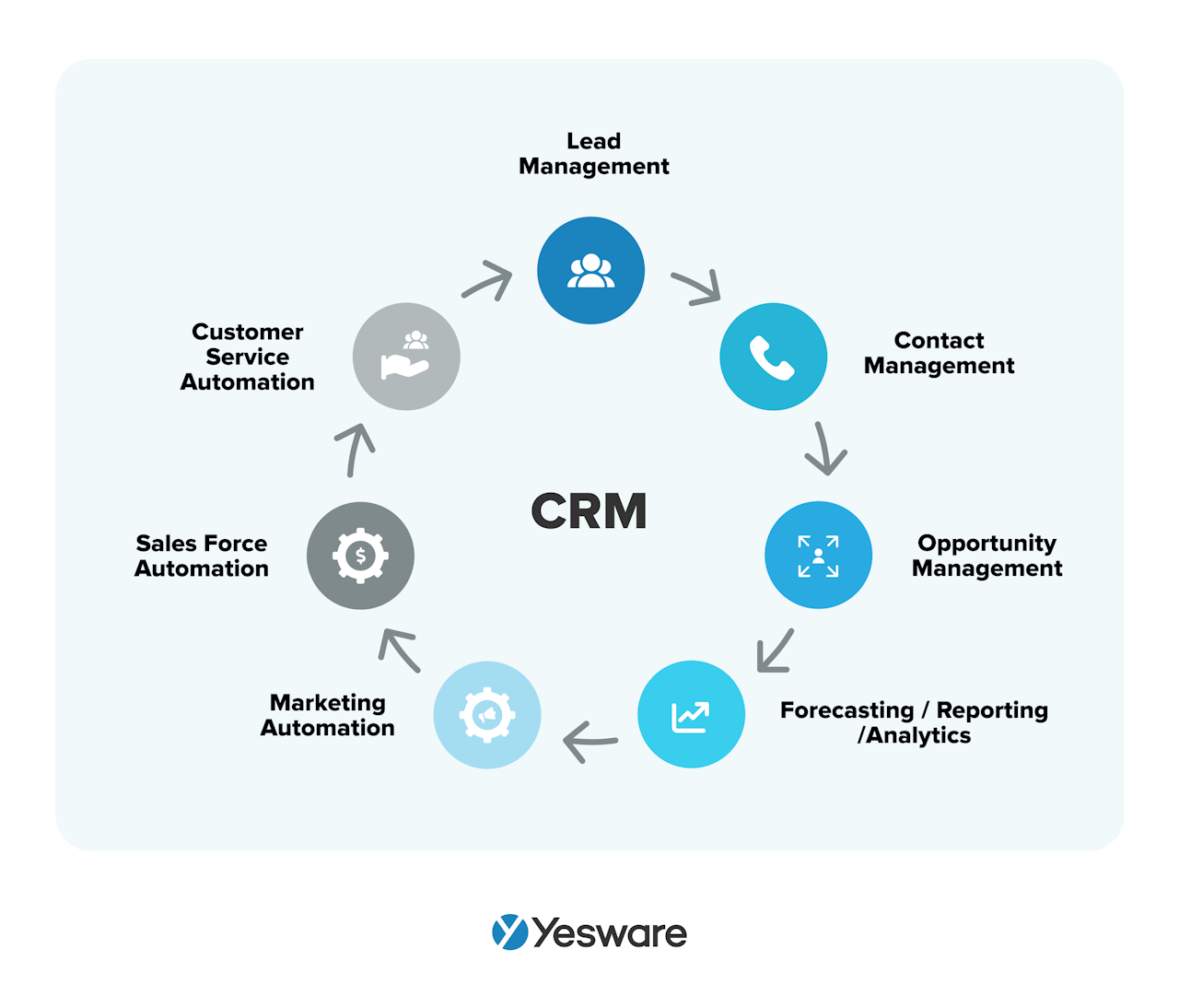 However, if sales managers are able to implement team-wide training on their CRM platform, it can be an invaluable tool for tracking and managing customer relationships.
However, if sales managers are able to implement team-wide training on their CRM platform, it can be an invaluable tool for tracking and managing customer relationships.
Sales Automation Tools
Beyond contact management, sales teams also have a number of other sales automation tools to consider that may assist their sales process. The following is a non-exhaustive list of the types of tasks that sales automation software can help with:
- Sales prospecting
- Lead generation
- Lead nurturing
- Call recording and analysis
- Calendar management
- Data enrichment
- Video conferencing
- Note-taking
- Sales engagement
- Sales enablement
- Email analysis
- Sales forecasting and budgeting
Regardless of the platforms you consider to add to your tech stack, keep in mind the Yesware “Tech Trifecta” when it comes to choosing new software: simplicity, ease of integration, and automation & acceleration.
Continuous Improvement
All successful sales teams work with a mindset of continuous improvement.
In other words, individual sales reps and sales teams as a whole know that there is always more to learn, and they look for ways to consistently challenge themselves.
This concept is similar to what’s known as a “growth mindset” in psychology. 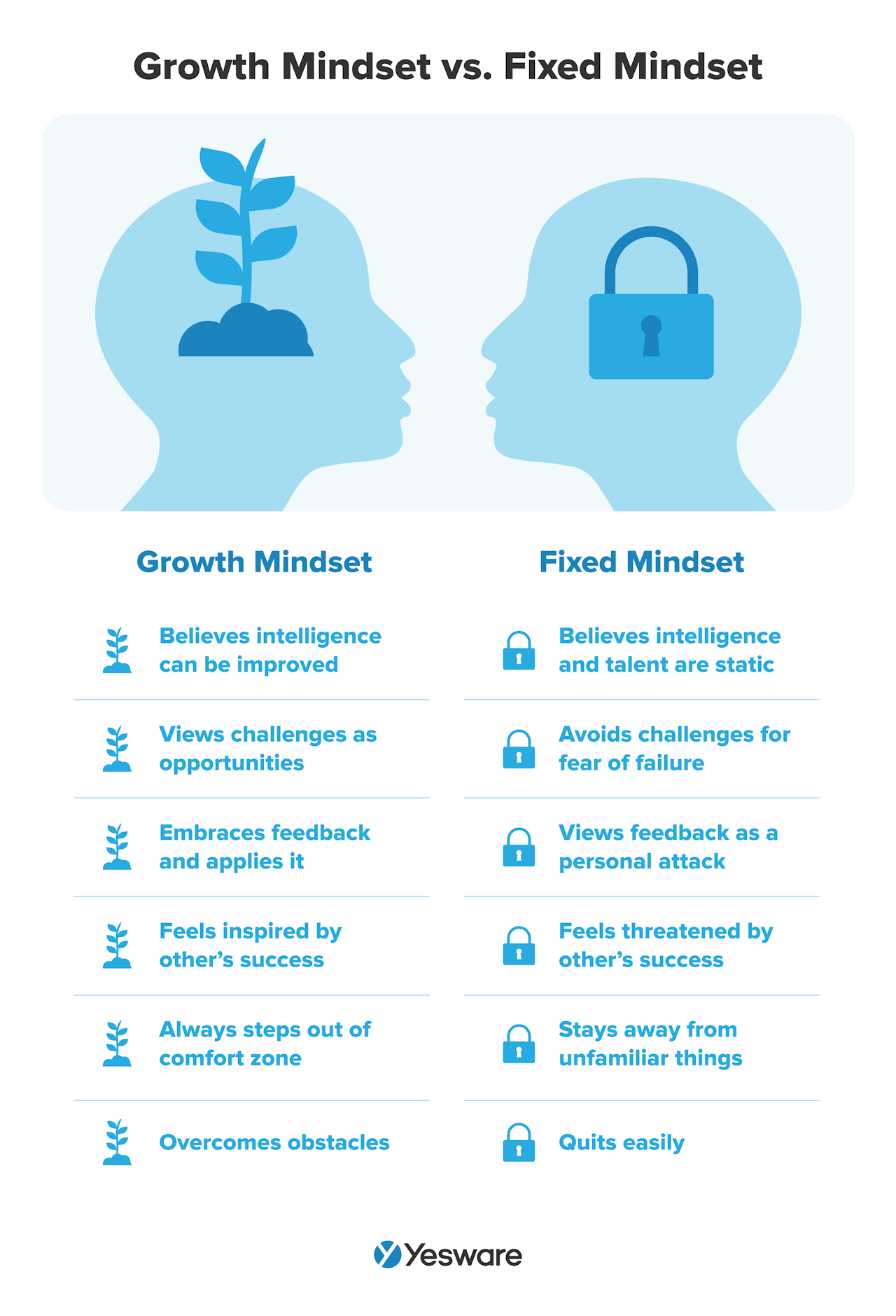 In order to continuously exceed goals and reach new and more ambitious heights, sales teams need to consistently analyze their sales data alongside formalized A/B testing processes.
In order to continuously exceed goals and reach new and more ambitious heights, sales teams need to consistently analyze their sales data alongside formalized A/B testing processes.
Sales Data Analysis
Sales data analysis is the process of collecting, collating, and evaluating sales results to gauge overall performance. Effective sales analytics practices are essential for data-driven decision-making.
The tricky part about sales data analysis isn’t the data itself — in today’s digital age, there’s virtually no limit to the amount of data sales teams can uncover about a prospect.
In fact, therein lies the problem: there is almost too much data for individual sales reps to use productively.
There are many sales data analysis and predictive analytics tools available on the market that are built to help teams digest large volumes of prospect and customer data and continuously update it for accuracy.
A/B Testing and Experimentation
A/B testing — also sometimes known as “split testing” — is the process of deploying two versions of the same concept to test the effectiveness of a single variable. 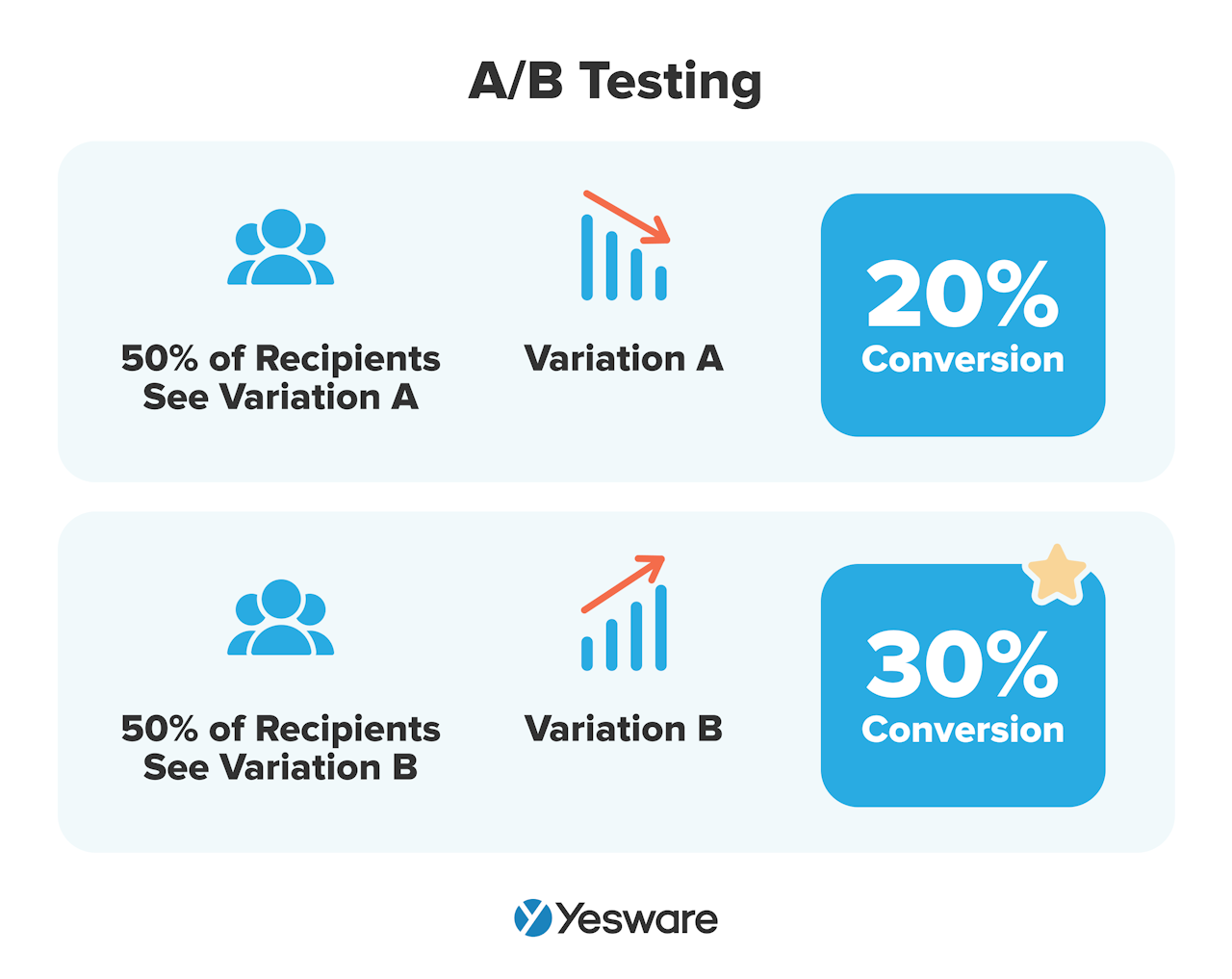 This type of experiment is very straightforward and controlled, but many sales teams have learned to leverage their tech stack in such a way that they can run very complex multi-variable testing to truly optimize each and every part of their sales process.
This type of experiment is very straightforward and controlled, but many sales teams have learned to leverage their tech stack in such a way that they can run very complex multi-variable testing to truly optimize each and every part of their sales process.
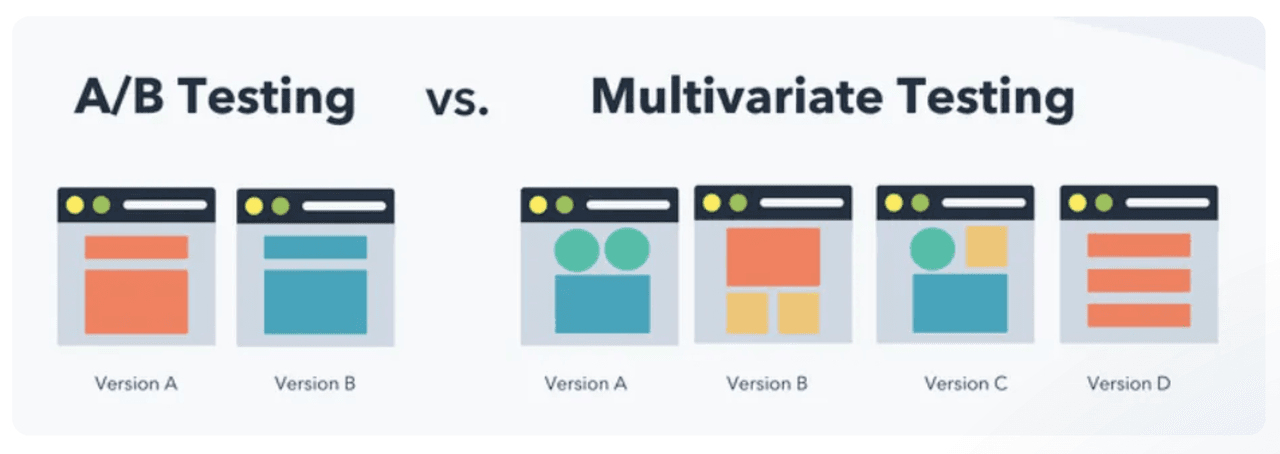
One of the best things about A/B testing and other experimentation within the sales process is that it can be used across all stages of the sales funnel. From email campaigns to cold call scripts to pitch decks, there are very few things that sales and marketing teams can’t test and optimize.
Effective Sales Techniques
The rise of digital sales (especially in the context of the pandemic and other major societal shifts over the past several years) has paved the way for a new core group of sales techniques that sales reps can rely on throughout the sales process.
Buyers today have little to no tolerance for being “sold to,” even when they themselves make no pretenses that they’re in the market to make a purchase. Sales reps need to be very savvy about how they manage their relationships with prospects.
The following sales techniques are some of the most important for sales reps to master with today’s buyers.
Consultative Selling
Consultative selling is one of the most effective sales techniques for sales reps to use in the field, regardless of their industry or the preferences of their target buyer. 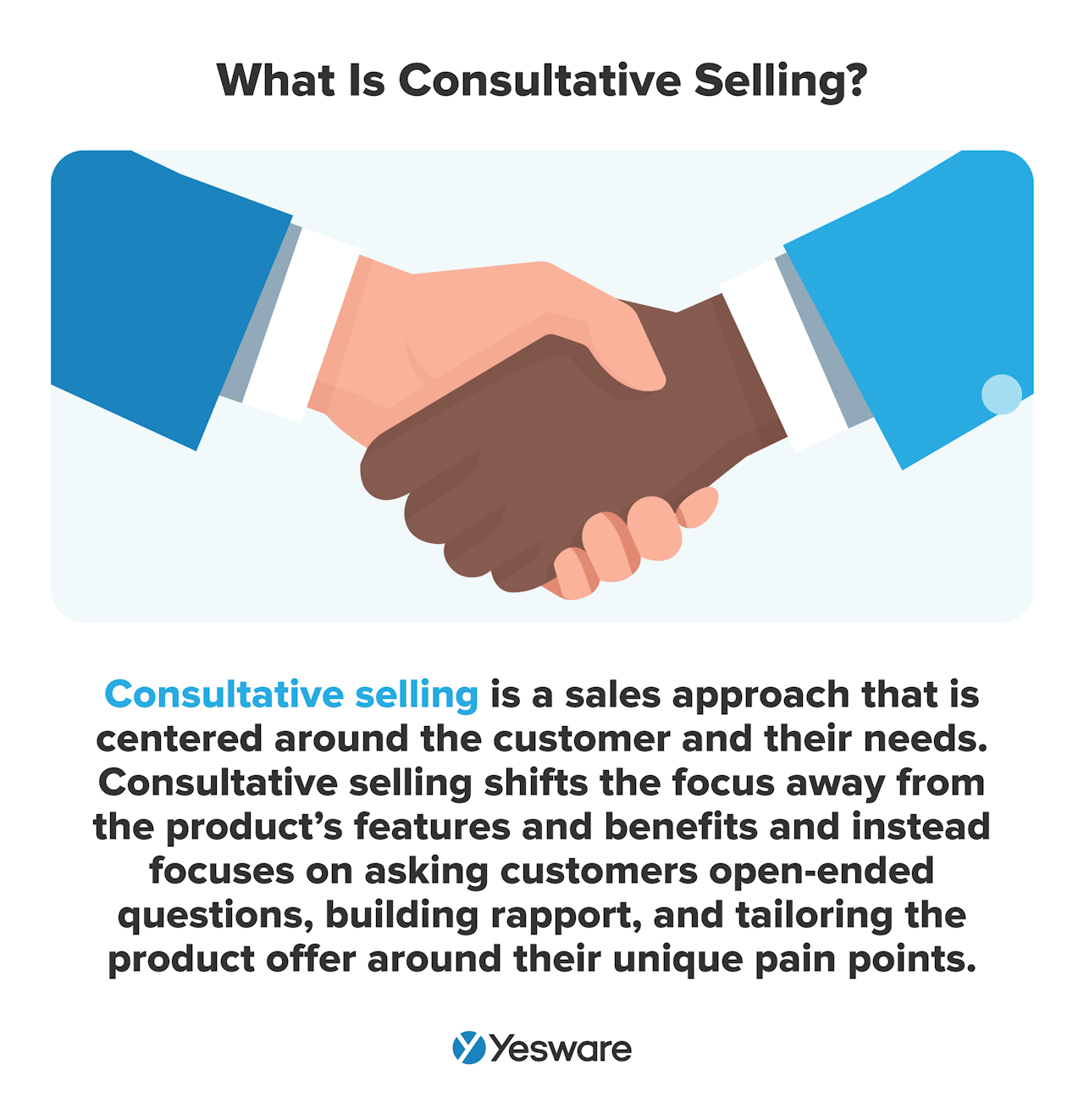 This sales strategy helps sales reps qualify leads more effectively and, subsequently, build deeper and more value-driven relationships with prospects and customers. It creates sales relationships that are mutually beneficial and productive, which leads to a loyal customer base and lucrative referrals.
This sales strategy helps sales reps qualify leads more effectively and, subsequently, build deeper and more value-driven relationships with prospects and customers. It creates sales relationships that are mutually beneficial and productive, which leads to a loyal customer base and lucrative referrals.
Solution Selling
Solution selling is actually not a new sales strategy; it’s been around since the 1990s. 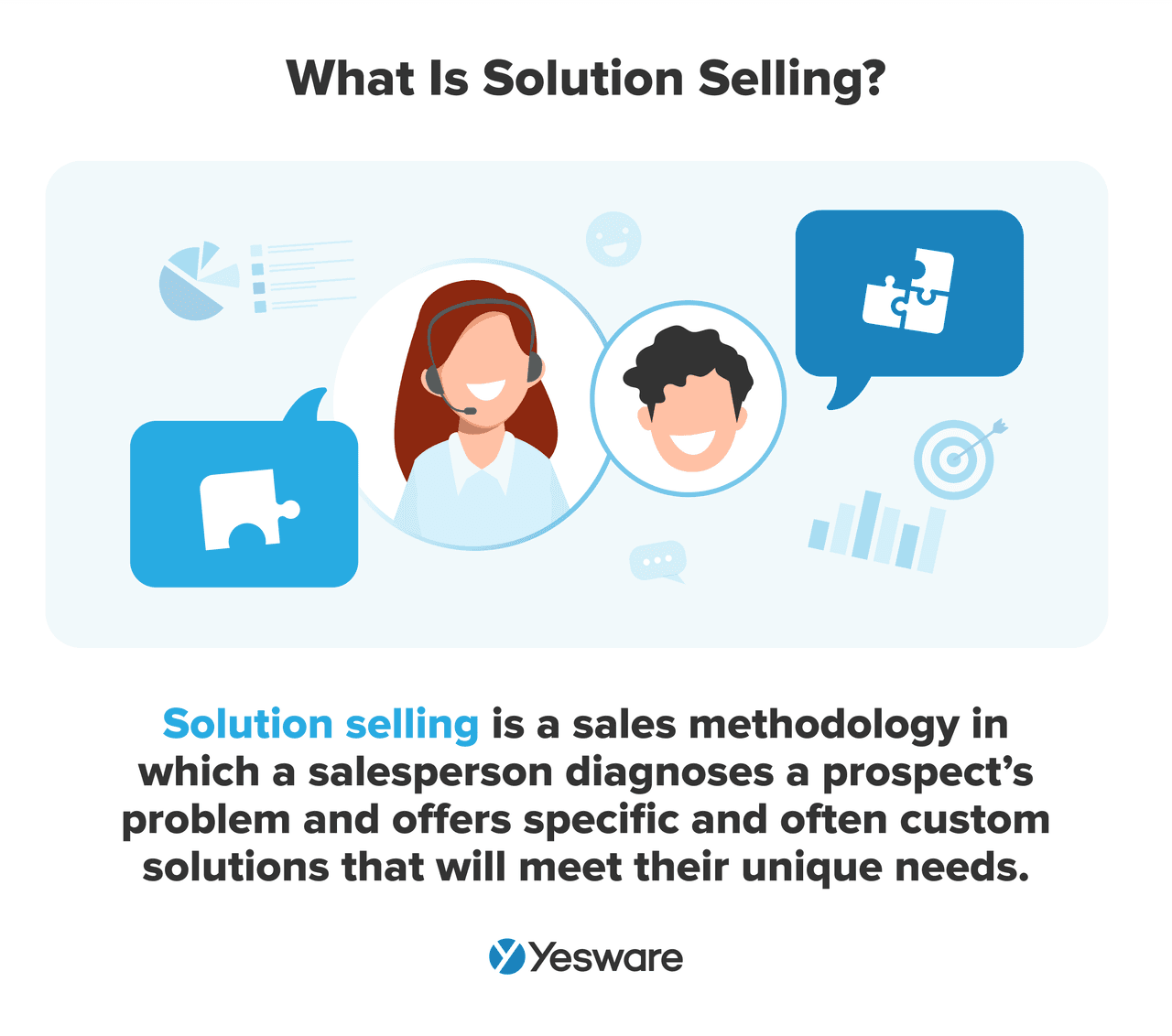 Far from being obsolete, though, Solution Selling is one of the few sales techniques that has stood the test of time and continues to generate success for many sales reps.
Far from being obsolete, though, Solution Selling is one of the few sales techniques that has stood the test of time and continues to generate success for many sales reps.
Solution Selling works really well for customers who require customized or otherwise complex solutions. Solution sellers often create their offers in bundles or packages, custom-built for their specific prospect with a completely unique set of à la carte features so that each of their needs are met for a complete solution.
Relationship Building
Regardless of the specific sales methodology your team uses when they talk to prospects, one of the most important skills they can master is the art of building genuine relationships.
One way to do this is to shift their mindset away from the potential transaction and more toward relational understanding.
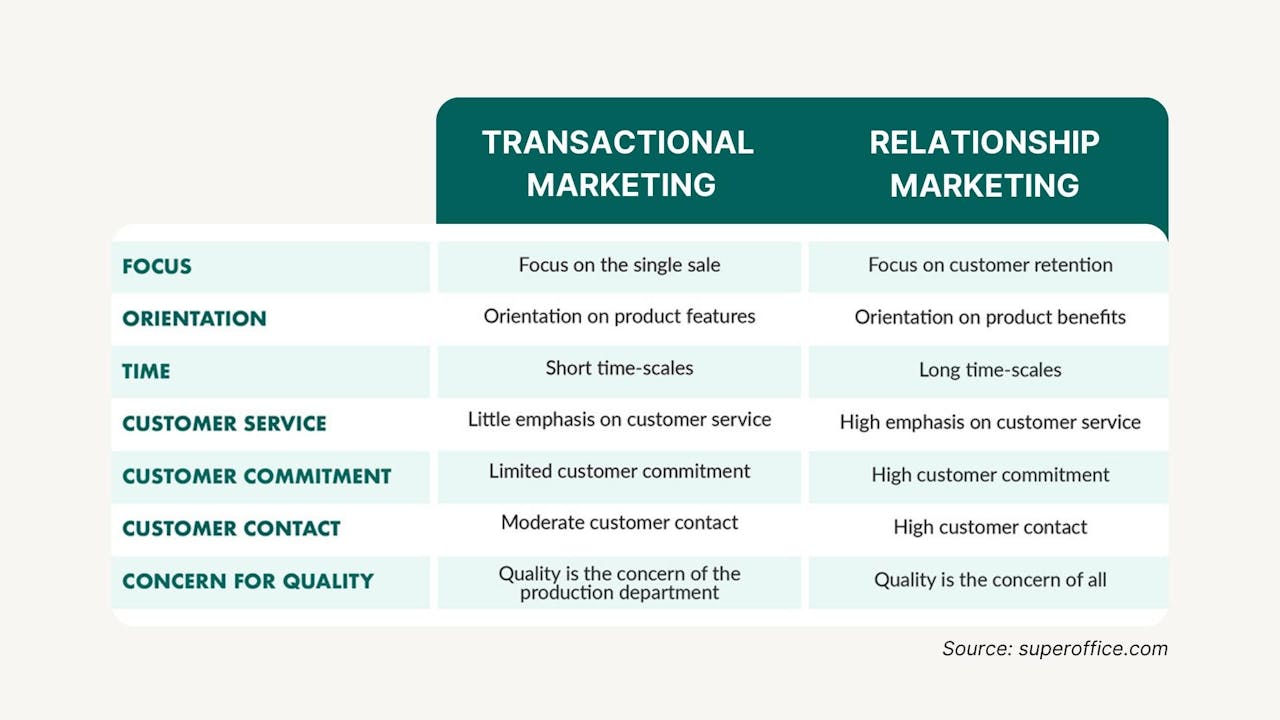
Buyers today would prefer to buy from people they trust. When sales reps put the time and energy into building relationships, it demonstrates to buyers that they truly care about understanding and meeting their needs.
Objection Handling
Sales objections are a completely normal part of the sales process. Sales reps who interpret them as a stumbling block are unlikely to ever become top performers.
The most successful sales reps know that objections, when managed correctly, can become opportunities.
Learning how to handle objections can actually be fun, once you get the hang of it. And it’s much less complicated than most sales reps expect.
The truth is, most effective objection responses are pretty similar to normal conversation.
Take “The Best Friend Formula,” for example, a framework developed by Yesware’s own head of sales.  This is very easy to execute in real-world conversation. Take a look:
This is very easy to execute in real-world conversation. Take a look: 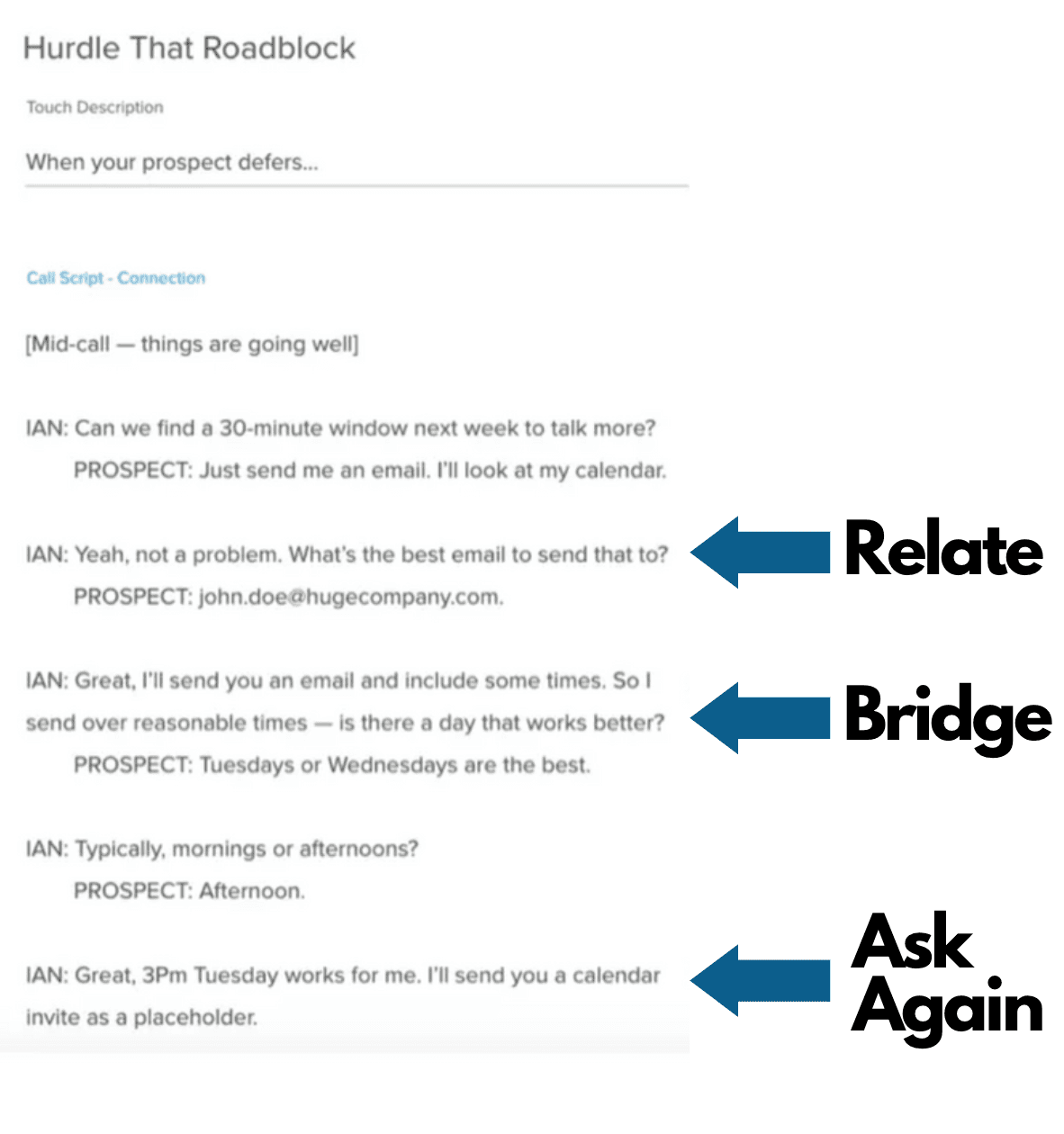 There are a number of other specific strategies that sales reps can practice, but they should also feel free to rehearse their own conversational techniques that feel natural and persuasive for them.
There are a number of other specific strategies that sales reps can practice, but they should also feel free to rehearse their own conversational techniques that feel natural and persuasive for them.
Closing Strategies
Although closing is like “the finish line” of the sales cycle, it can often feel like the opposite of coasting for many sales reps. There’s a lot of pressure during this stage, and no matter how successful a rep is throughout the rest of the sales process, none of it will matter if they can’t close deals.
One of the most important things to remember as you approach the close is to involve all relevant decision-makers. Research shows that most B2B sales now include an average of 7 stakeholders or decision-makers, all of whom will likely need to be looped in at some point throughout the process. The faster sales reps can connect with these influential people, the more likely they’ll be to execute the close.
Customer Relationship Management
Long-term success in sales ultimately comes down to how well your sales, marketing, and customer success teams are able to maintain long-term, mutually valuable relationships with buyers.
Building Long-Term Customer Relationships
It’s rare in B2B sales that a closed deal occurs without a solid relationship between buyer and seller. Emotions play into B2B sales decisions a lot more than buyers like to admit.
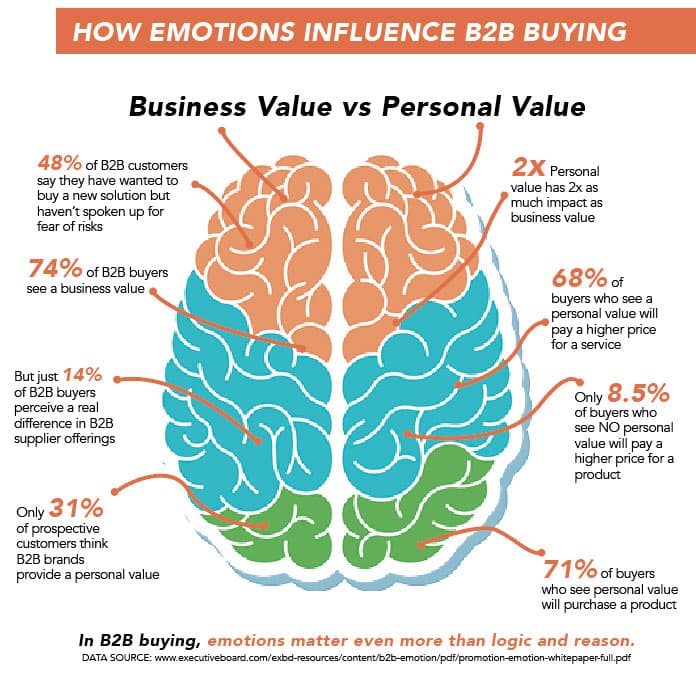
The key to building strong customer relationships is to personalize every interaction. The more you know about each prospect and customer, the more effectively you can build an authentic relationship with them.
Note, though, that personalization means more than just remembering a prospect’s name and the right time to call them. It’s really about delivering value to them at every stage of the process and finding the right way to pitch your product so that it speaks directly to their unique needs.
Post-Sale Follow-Up and Customer Care
Managing long-term customer care is sometimes assigned to a dedicated Customer Success team. That being said, even if your organization has access to that kind of resource, it’s still important that sales reps maintain contact with the customers they signed. This adds a personal touch and element of care that goes a long way with buyers and, subsequently, your brand reputation.
Paying careful attention to the way your customers feel after the sale can also increase your customer lifetime value (LTV) and referral success. A strong sales best practice is to always keep track of this sales metric. 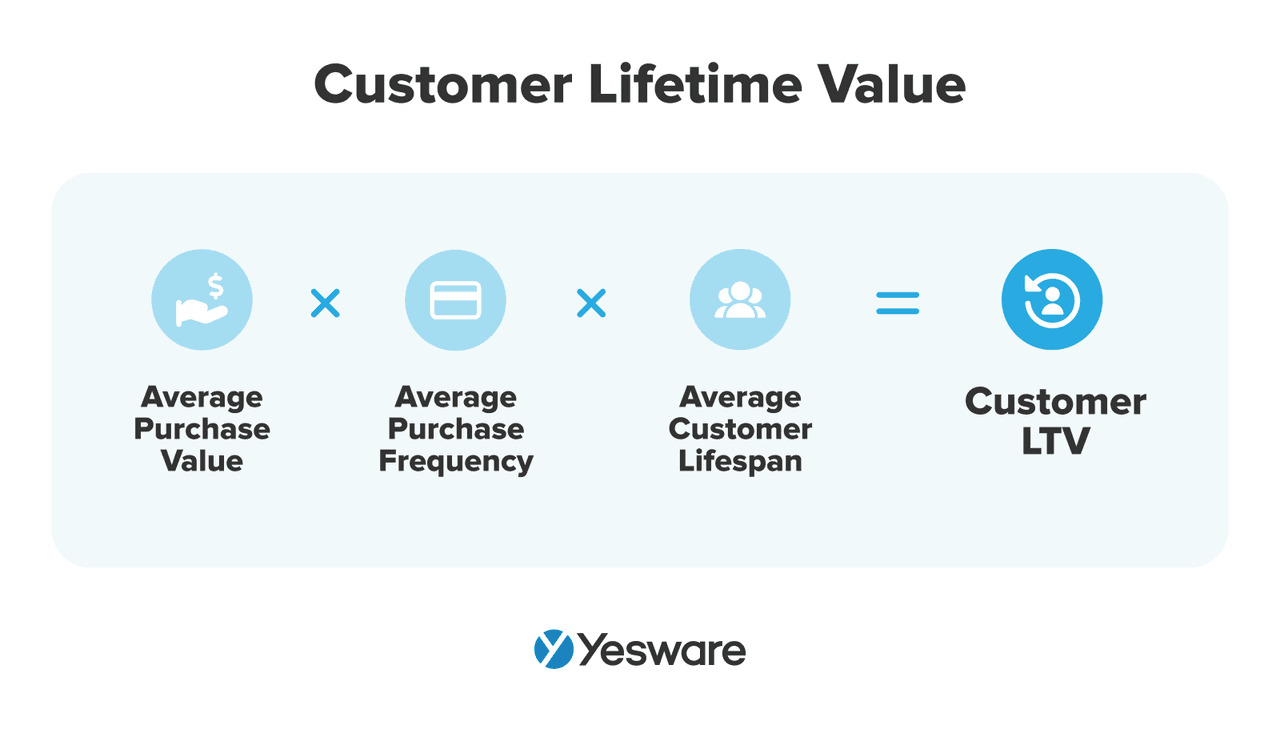 At Yesware, we like to add some science to this process with something called the “Trust Equation.”
At Yesware, we like to add some science to this process with something called the “Trust Equation.”
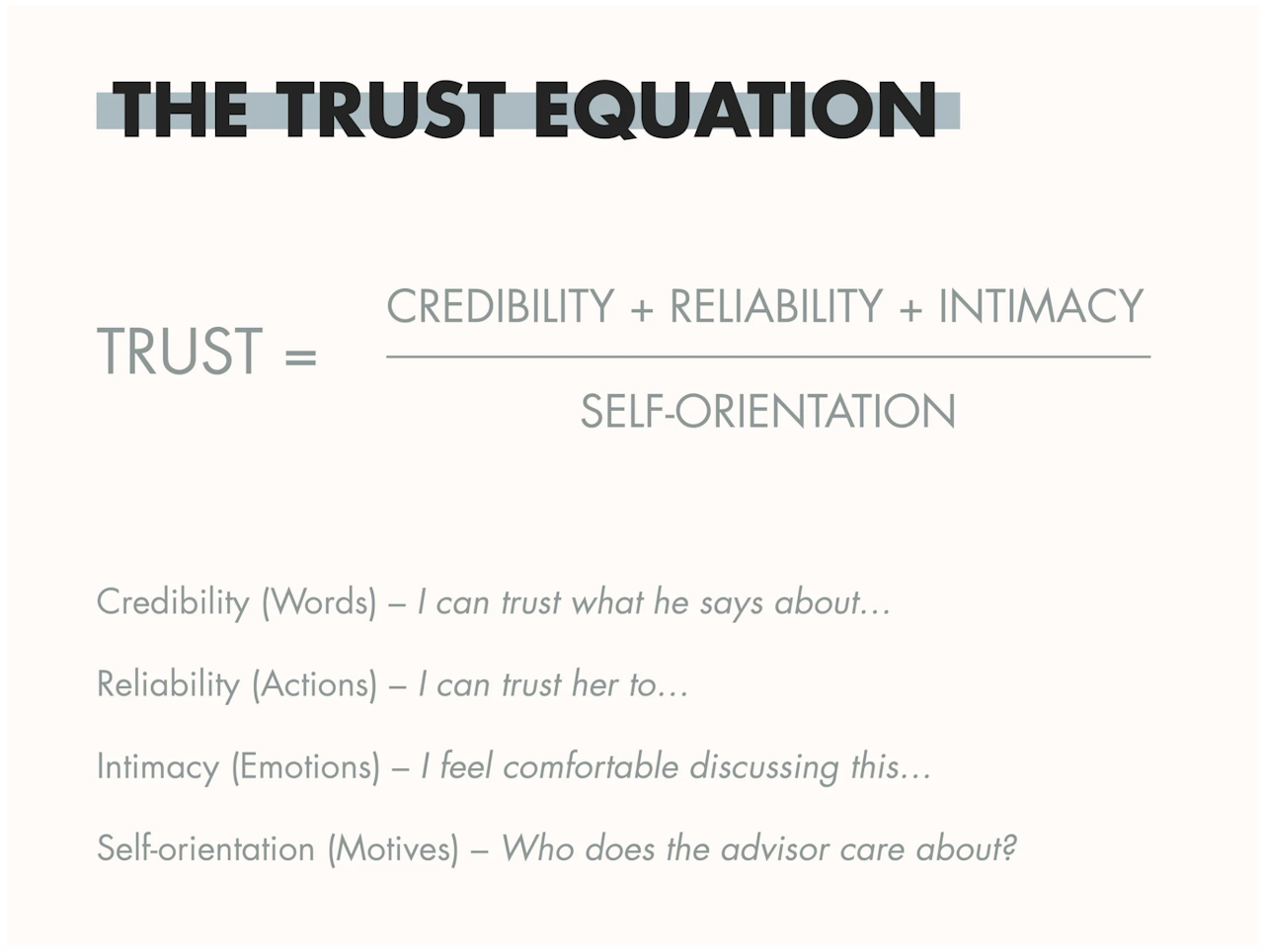
Long-term customer relationships are extremely valuable for your organization. In addition to their increased LTV, happy customers also provide lucrative referrals for your business. And sales referrals are like gold. 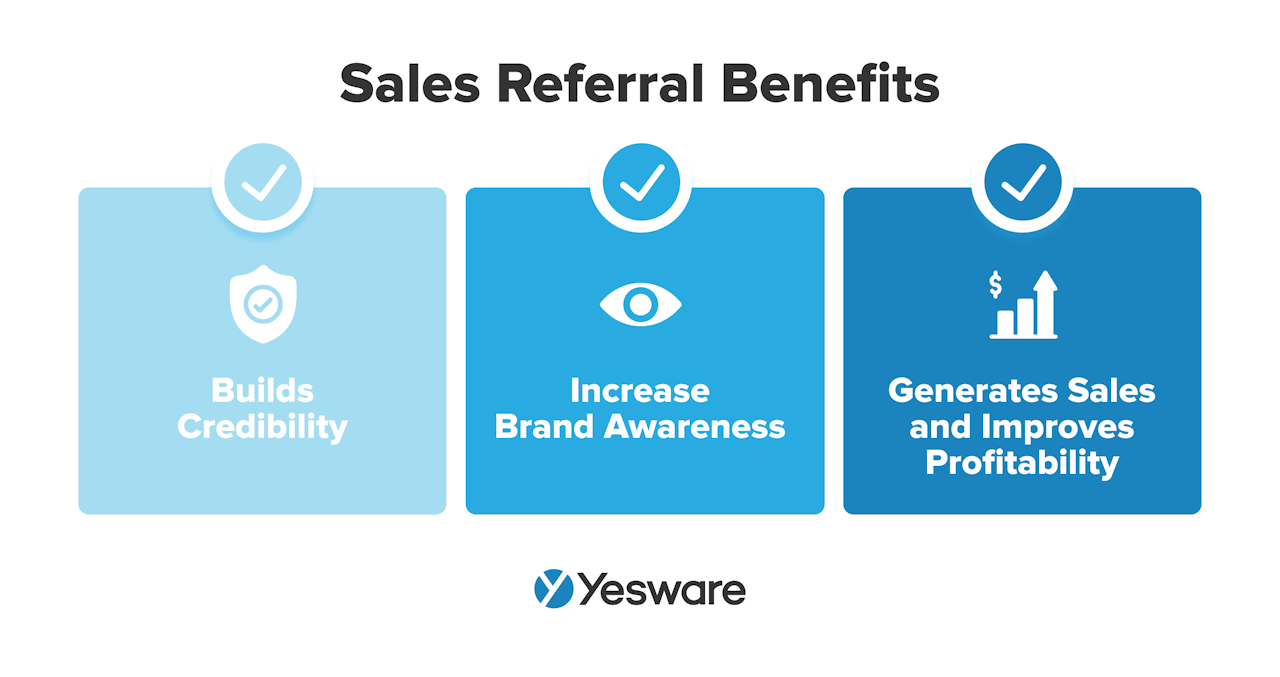 Staying in touch with customers can be easier than most sales reps think.
Staying in touch with customers can be easier than most sales reps think.
With software like Yesware, you can schedule and automatically send follow-up emails at regular intervals, so all you have to do is set it and forget it once you make the sale.
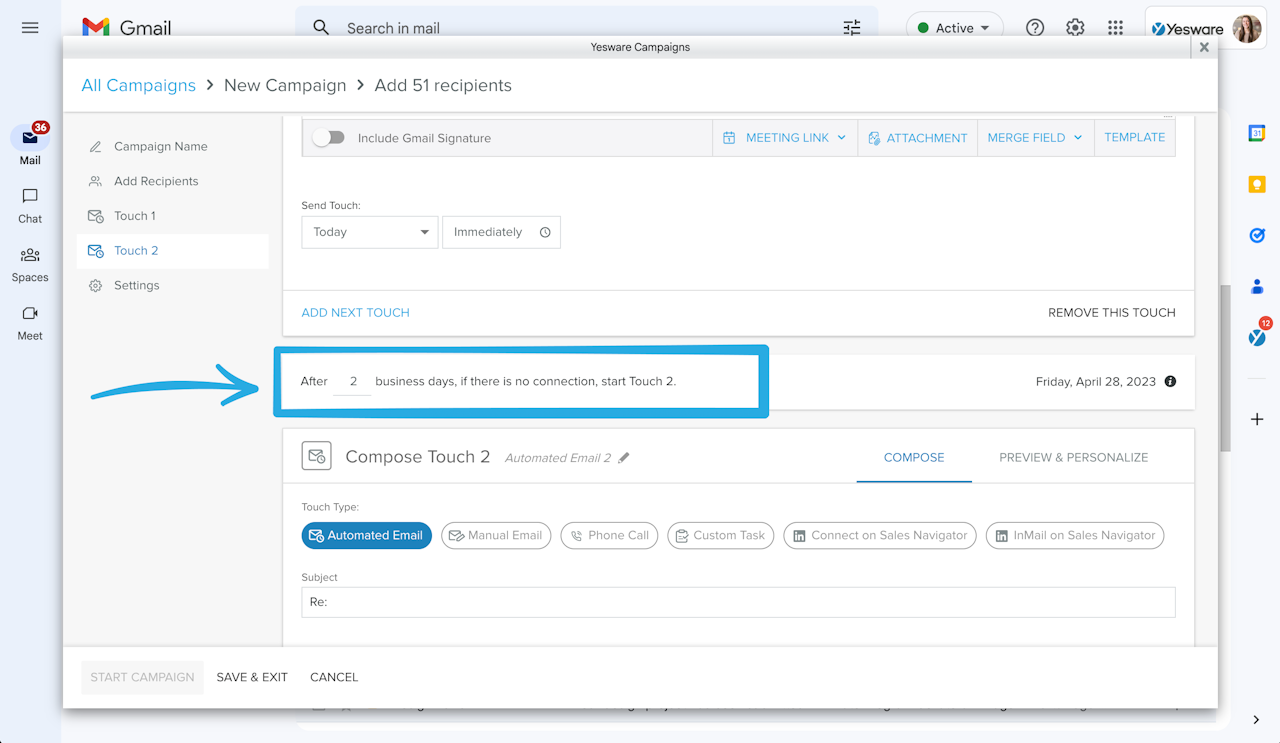
Obtaining Customer Feedback
Customer feedback is crucial to optimizing the sales process. Sales reps should regularly distribute customer surveys, as well as offer easy opportunities for happy customers to provide testimonials.
Some particularly enthusiastic customers may also be willing to provide a case study for you. These are both valuable forms of social proof that can go a long way with future prospects. 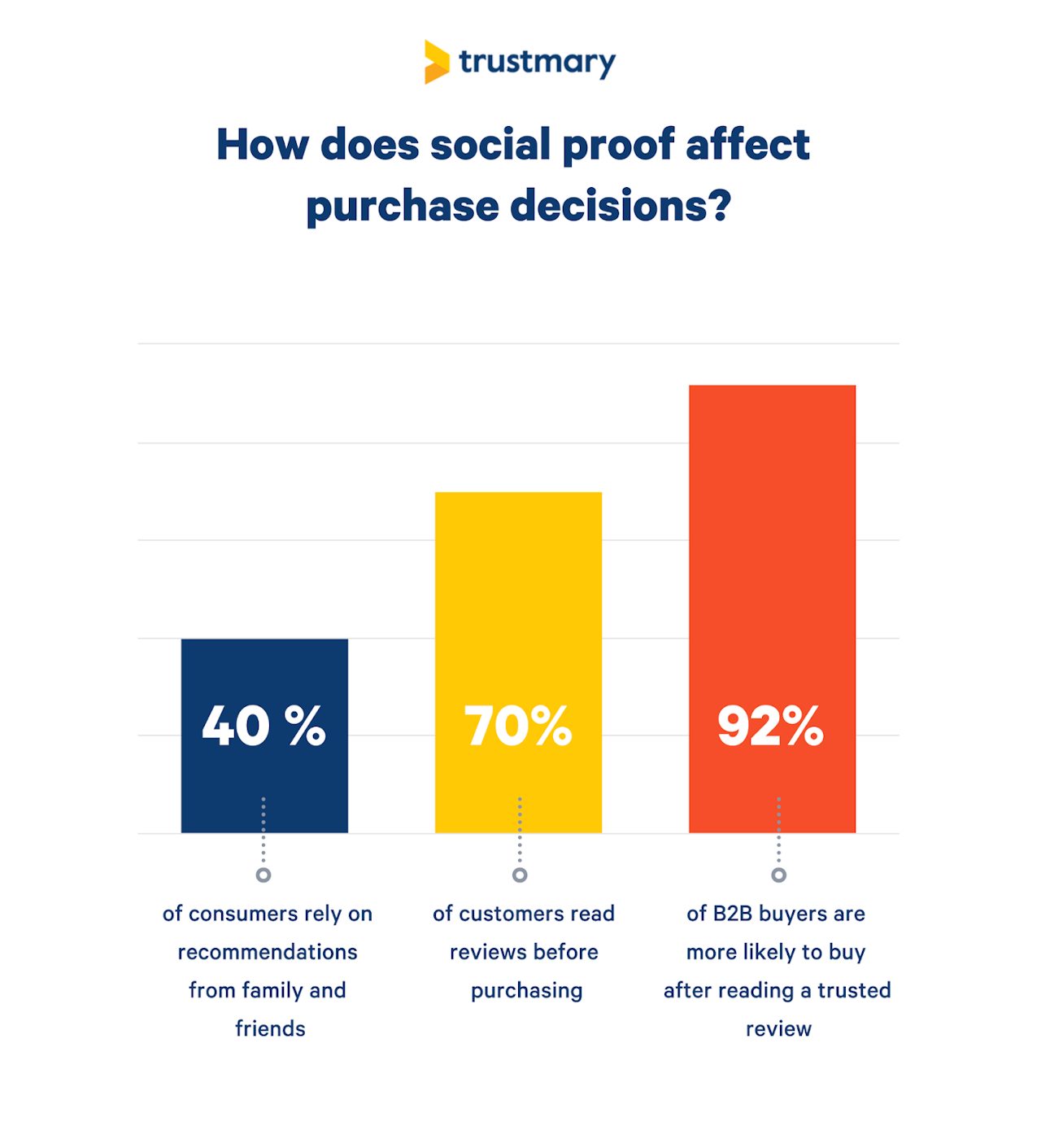 Which sales best practices does your team currently rely on? Are there any that you can recommend that didn’t make our list?
Which sales best practices does your team currently rely on? Are there any that you can recommend that didn’t make our list?
Get sales tips and strategies delivered straight to your inbox.
Yesware will help you generate more sales right from your inbox. Try our Outlook add-on or Gmail Chrome extension for free, forever!
Related Articles
Casey O'Connor
Casey O'Connor
Casey O'Connor
Sales, deal management, and communication tips for your inbox

